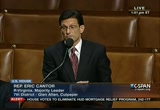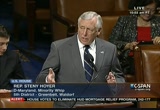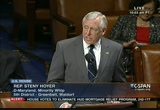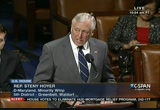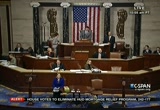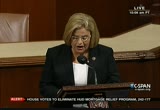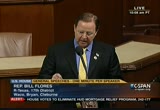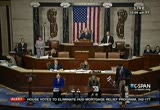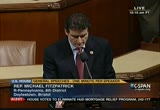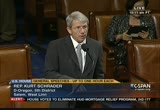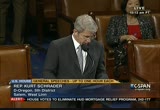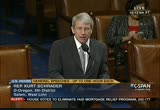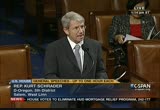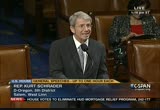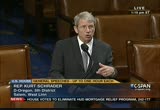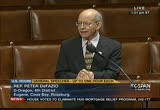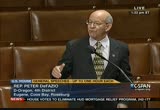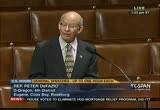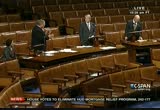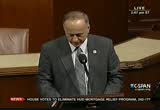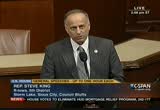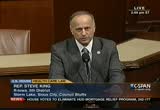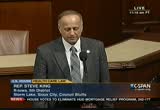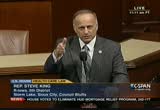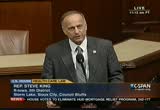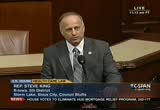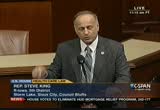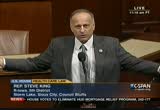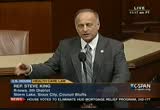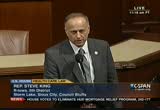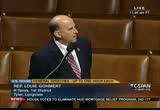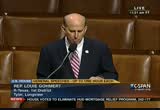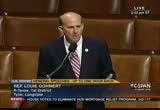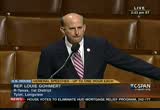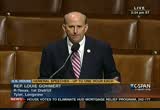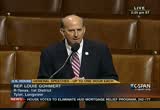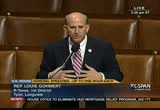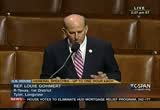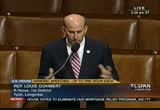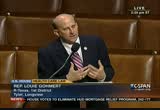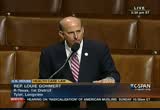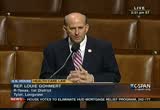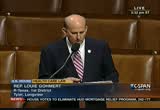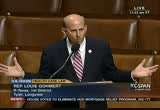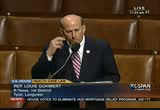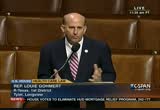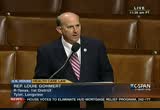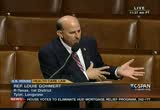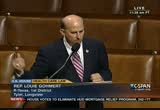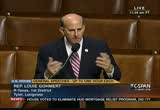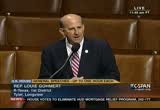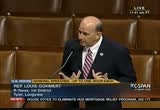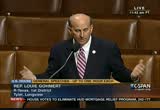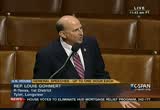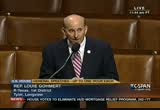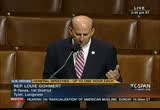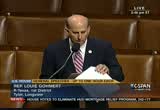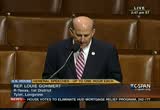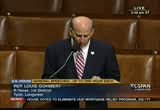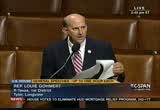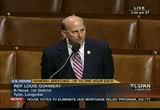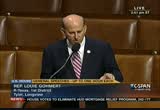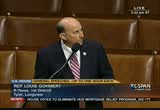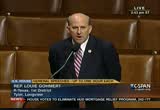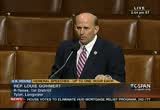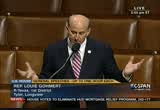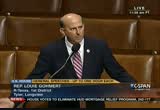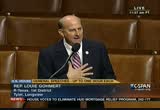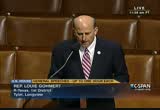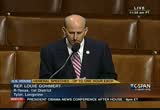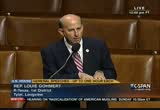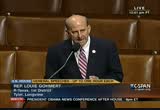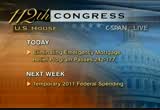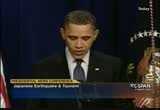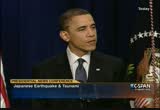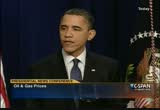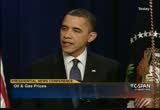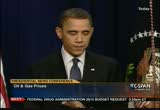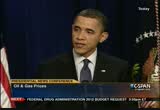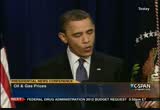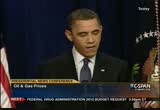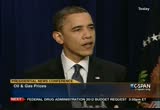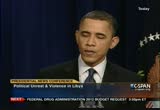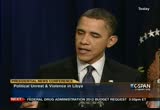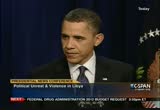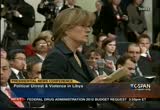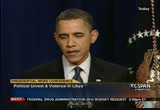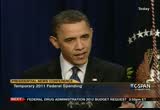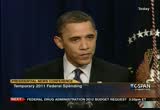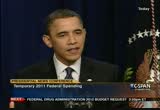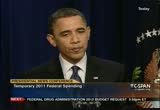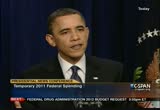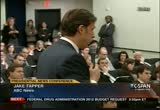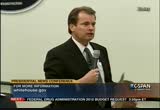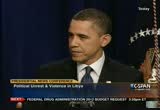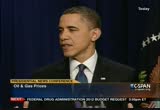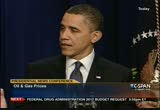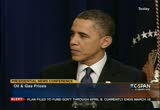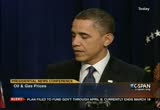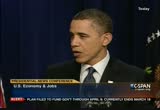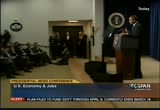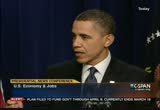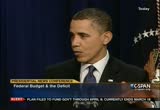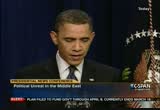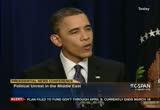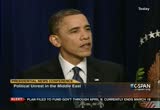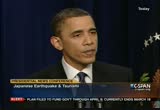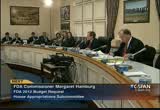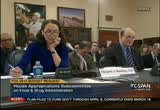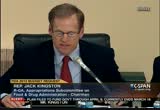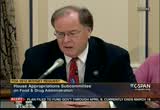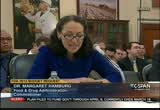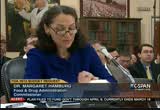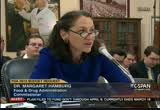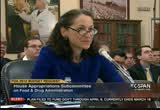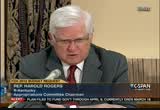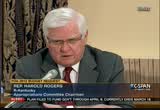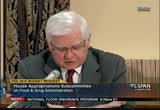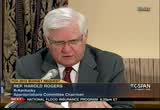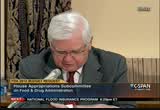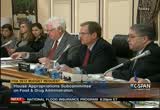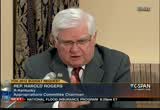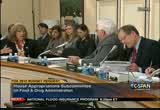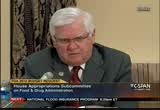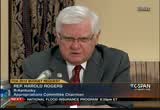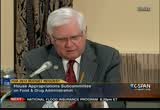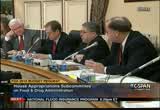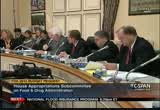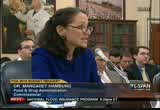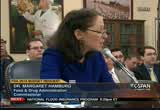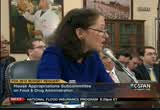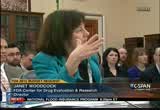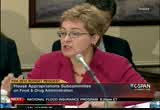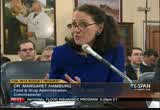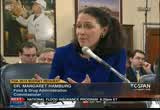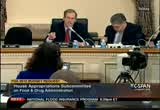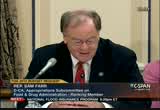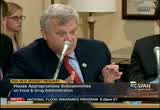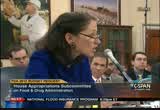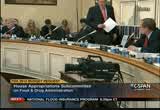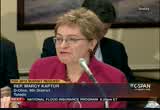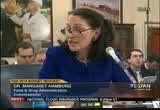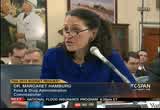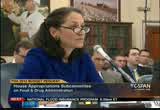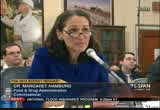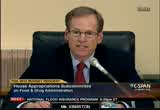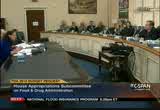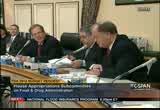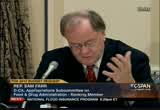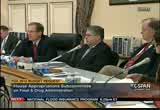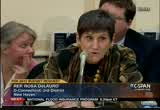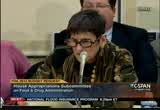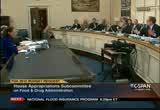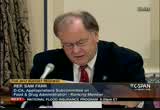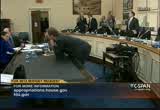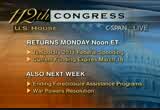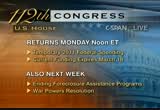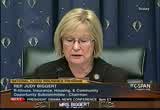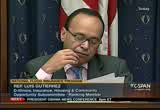tv U.S. House of Representatives CSPAN March 11, 2011 1:00pm-6:30pm EST
1:00 pm
offer here and there of the $51 billion. the president's indicated he could sign that. he said that publicly. now, that's our offer sitting on the table. my suspicion is you've rejected that offer. mr. cantor: i will say -- mr. hoyer: and if you've rejected it, what is your counteroffer is my question. i yield. mr. cantor: not to belabor the point, but i will say, mr. speaker, that there was not 60 votes in the senate for the offer he speaks of. in fact, there were more votes for the $60 billion off of the current funding levels that is our plan, so there is really no offer on the table that is valid because it can't pass the senate. . what is the democratic senate offer on the table? the gentleman rightly says it is up to us in congress, the people elect us, to try and come together and agree upon a
1:01 pm
spending plan. what's the offer? there is no offer that could pass. in the senate. we passed the house version. we know where the house stands. so i'm just having difficulty understanding where the offer is. so again, mr. speaker, i think the gentleman has made his point. he's frustrated because he sees there's no movement because the senate's been unable to get an offer on the table that can garner 60 votes. so the gentleman wants us to negotiate with ourselves. no, we want to cut spending, keep the government opened. that's why we are in the position we are to do another stop-gap measure so that we can -- stopgap measure so that we can hopefully iron out some differences, cooperate, trying to keep the government open and cut spending so people in the private sector get back to work. i yield back. mr. hoyer: i thank the gentleman for yielding. as i understand what the gentleman's saying, if the
1:02 pm
senate can't get 60 votes, which we have seen the gridlock for a long period of time where the senate can't get 60 votes, we are not going to go anywhere from the offer that he's made to pass something that can in fact garner 60 votes in the senate. i regret that the senate, frankly, didn't get 60 votes for our offer. and he is correct that he got a few more votes for h.r. 1 than was gotten for the senate majority leader's counteroffer. but the fact of the matter is this is really an issue between the republicans and the democrats. senator mcconnell has said, as i know the majority leader says, we'll pass what the house passes. that's what he said. now, if that's the case, then we need to pass something that can garner 60 votes over there. we know that h.r. 1 couldn't get 60 votes. we know that senator reid's
1:03 pm
proposal couldn't get 60 votes. if we are going to move this government forward and not fund it on two-week cycles and senator mccain has said that funding defense department on two-week, or three-week cycles is undermining our national security, so there is no disagreement that doing things two weeks at a time does not make sense. if the gentleman's view is simply you will not make some offer that we think, and we can have a discussion about, trying to come to agreement on that, that we can get 60 votes for in the senate and we are going to fund it on two-week cycles, i say to my friend that's going to be damaging to the economy, create great uncertainty, and undermine our national security. i would hope that the gentleman would see fit to determine where we can meet somewhere in the middle. we think we have got 51% of the way towards your 100. you keep talking about 60. that was not your pledge. your pledge was 100. the way you got to 100 is count
1:04 pm
to 41. we have done that. we have done another 10. so we have come. we think 51% of the way. you don't count it that way. we understand that. but whatever way we come, we need to move on. you won the majority, god bless you. i'm sorry about that, but i live with it and there it is. you have the majority. and with the majority you have the responsibility to see if we can move this country forward. that's what newt gingrich said anti-can't be the perfectionist caucus as he referred to of sticking just at a number that doesn't have the votes in the united states senate. if we are going to be on this two-week cycle, i will tell my friend you may keep passing this two weeks at a time, none of us want to shut down government, but i will tell you while i and my colleagues, some of my colleagues may vote to do this one more time, for me it's the last time. we need to have a plan to fund this government for the balance
1:05 pm
of the fiscal year to september 30. it is irresponsible for us not to have that. and just each of us sticking to our number and you sticking to your number and just pointing fingers at one another saying the senate can't get 60 votes for anything we propose will not serve our country or our people. unless the gentleman wants to say something further, i'm going to yield back the balance of my time. i yield back the balance of my time. the speaker pro tempore: the gentleman yields back. for what purpose does the gentleman from virginia rise? mr. cantor: mr. speaker, i ask unanimous consent that when the house adjourns today it adjourn to meet on monday next when it shall convene at noon for morning hour debate and 2:00 p.m. for legislative business. the speaker pro tempore: without objection, so ordered.
1:06 pm
the chair will entertain requests for one-minute speeches. without objection. the gentlelady is recognized for one minute. ms. ros-lehtinen: i rise today to recognize a great individual of my south florida community, dr. michael alexandri for his work with children and young adults who have been diagnosed with autism. a professor of psychology at my alma mater, the university of miami, will be honored by the kesher annual scholarship journal dinner to celebrate his commitment to this amazing organization. kesher, an organization that provides an academic and jewish education to children with special needs, was formed in 1995 with two classrooms and 20 students. today with the help of the doctor, the organization is shaping the lives of over 80 children and young adults with
1:07 pm
autism through their personalized student curriculum. his dedication to helping children and young adults with autism obtain an education has been fundamental to the success of kesher. once again i would like to congratulate him and all of the staff, faculty, and parents, and the students and help others follow his lead in making our community a better place in which to live. i thank the speaker for the time. the speaker pro tempore: the gentlelady yields back. for what purpose does the gentleman from texas rise? without objection, the gentleman is recognized for one minute. >> thank you, mr. speaker. unemployment is still at nearly 9%. $4 gasoline is on the way and the obama administration still doesn't get it. they have locked up our domestic energy resources through the recently issued wildlands order
1:08 pm
which had no congressional authority. and they continue to pursue regulatory drilling moratoria. every developed country in the world looks to their own resources to fuel their economies. we have access to resource that is dwarf the strategic preserve. the united states has vast energy resources on our public lands and off our coast that belong to the taxpayer. mr. floor rest: this is -- mr. flores: this is why i have introduced a bill to extend offshore leases impacted by the obama administration's growing moratorium for an additional 12 months. this legislation would return time lost during the drilling moratoria adding certainty so the domestic producers can continue exploration without a looming lease expiration. we need the stability that comes from all of the above energy approach. we need a commonsense energy
1:09 pm
policy that brings stability to the marketplace, creates good-playing american jobs, grows our economy, reduces our dependence on foreign oil, and raises trillions of dollars to help pay off our growing $14 trillion national debt. we owe this to our children and to our grandchildren. thank you, mr. speaker. the speaker pro tempore: the gentleman yields back the balance of his time. for what purpose does the gentleman from pennsylvania rise? without objection. mr. fitzpatrick: thank you, mr. speaker. mr. speaker, this past week i had the privilege of addressing about 700 residents back home in my district, residents of the jewish retirement community in bucks county and to thank those residents and senior citizens for collectively putting together over 55,000 hours of community service, really outstanding community service back home in bucks county.
1:10 pm
some of the activities that accounted for a tremendous k-of hours -- amount of hours included reading to elementary school children, providing wheelchair escorts, sorting and packaging clothing, creating blankets for old children and providing comfort to those in need. mr. speaker, communities are built on service to others. through this service, the community is in fact strong and vibrant. the countless lives they have touched have made bucks county a stronger and better place to live and for that i salute them. i yield back the balance of my time. the speaker pro tempore: the gentleman yields back the balance of his time. under the speaker's announced policy of january 5, 2011, the gentleman from oregon, mr. schrader, is recognized for 60 minutes as the designee of the minority leader. mr. schrader: thank you very much. i would like to talk a little bit about what's been going on
1:11 pm
recently we heard a colloquy a moment ago with the minority leader and the majority leader talking about what's going on in h.r. 1 and some of the catastrophic cuts that are being proposed by our republican colleagues across the other side of the aisle. i spoke earlier during the debate on h.r. 1 and found that from the communications back in my district in oregon that people are actually taking it seriously. the people are actually worried we were going to do the devastating $60 billion worth of cuts within a short one-year time frame that has been universally panned, actually, by experts across the country. my colleagues and i on the democratic side have offered other alternatives. i think that are a little more reasonable. we all realize just like the gentleman from maryland a moment ago talked about, we have to make some reductions but we should make them in a serious way, something that's going to accomplish our ends. i think scaring americans
1:12 pm
needlessly is inappropriate. the cuts that they are talking about are not going to happen. the food and drug administration, we just passed a food safety bill in the last congress, and they want to cut out $240 million below the 2010 level, much less implement the food and drug administration safety work we have asked them to do. usda would be furloughing inspectors. our meat safety programs would not be safe. we would not be able to have a processing plants inspected on a regular basis going forward. the ability for some of our small rural communities to have safe drinking water hinges on the wastewater and drinking programs that we have. the revolving loan funds we have here in congress. reducing the programs as much as republicans want would cause, i think, serious problems. it would also eliminate and add 54,000 engineering construction and other support jobs cut as a result of this. we need to be adding jobs not subtracting jobs at this point
1:13 pm
in time. we also have state and local grants. states back home and our local communities are starving right now, a lot of the budgets are out of whack. the worst thing we can do is be cutting our state grant programs that hopefully fund the education, public safety, and health care needs of our local communities. we should actually be empowering them and helping them through these tough budget times. only the federal government has that ability. the firefighter grants are being cut, cops grants are being cut, our public safety is in serious risk here. i can't believe that this is actually being proposed in any serious man irwhatsoever. i have to assume it's all part of the political theater, part of the campaign still. it's time to get off the campaign trail, quit the political circus, and get back to actually worrying about serious reductions we got to make to put our country back in balance. and that means going to other programs. they are also wanting to cut titling 1 grants to school districts. this is the one area the federal
1:14 pm
government comes to the aid of school district with idea moneys they need to make sure they can deliver those high-s cost special needs programs to students. year actually cutting them. $700 million from one -- the formula programs we have here. it's a 4% cut to title 1 programming when our local districts need it the most. head starts start, a proven performance based program to get our kids off to a great start and great education so they don't need the remediation that we have to do later on in college and high school. they are cutting head start 20%. 200,000 children, 200,000 children would be kicked out of the head start program. i don't think that's the way you become a world leader. i don't think that's going to help our stem programs, do the research and innovation we need. pell grants, pell grants, a commitment we have made to american students i think it's really important back home in oregon i work very, very hard on a scholarship program that
1:15 pm
actually with our federal aid, our state aid, scholarship programs, parental involvement, and superintendent working at a minimum wage job during the summer, full-time, during the school year only part-time, could actually graduate from college, undergraduate degree, no more than 14,000 or $14,000 in debt. . by cutting the pell grant program from our promised level of $5,700 to $5,-- $4,500, that could mean competing with the best and brightest around the world. i can't believe that in h.r. 1 the republicans are cutting job employment services, more than $4 billion, $4 billion in cuts to job training programs. this is unconscionable, folks. this is exactly the time when
1:16 pm
we need to get these dislocated workers back into the work force. the trade adjustment act cuts or unconscionable. we need to make sure there's an opportunity for these folks to retrain, get back in the work force. help get the economy back on track. cutting these programs just doesn't make any sense. they're even cutting social security here, folks. they're even cutting social security. pretty amazing. they cut the funding operational budget from $125 million below the 2010 levels. $125 million out of social security and $1 billion below the president's request level for 2011. they apparently don't think we need technology to improve our social security's ability to work with seniors, to make sure they're getting the services they need, to cut down mistakes, cut down on that fraud and abuse in the benefits program for our deserving social security recipients. they don't care. they really don't care.
1:17 pm
it's pretty amazing the range and scope of these -- of these cuts. we've listened to ben bernanke in the budget committee say that the republican plan will result in hundreds of thousands of jobs lost in this country. mark zandi, mccain's economist, you know, he puts a number on it, 700,000 jobs lost. goldman sachs, not exactly a -- something of liberal virtue, may hit g.d.p. by 32%. we need jobs, we need jobs, we need jobs. we need to be smart how we go about this. right now we need surgical cuts, not the meat ax approach that's being proposed by our colleagues on the other side of the aisle. i offered up a proposal during debate that would cut our costs, cut our budget by about $22 billion. kind of a nice intermediate approach from where our senate
1:18 pm
friends is from where the republicans started. it also looks at the defense budget. i'm a huge support of our warriors overseas and in this country they do great things, whether it's a local disaster or catastrophe or a serious problem abroad. but we got to look at the contracting. we got to look at the weapons procurement programs. i mean, secretary gates himself has been very, very clear that there is lots of room, lots and lots of room for improvement there. i think we need to work on a bipartisan approach, enough of the political theater, frankly on both sides. it's time to sit down, look at the individual programs and services that are most in need for this country right now. and until we're willing to sit down and do that, we are going to continue to do these two, three-week continuing resolutions that's making a mockery funding the government, funding the united states of america two weeks at a time. i don't think it -- i think it makes us foolish in our constituents' eyes.
1:19 pm
there has been a lot of bashing against our public sector employees across the nation. public sector jobs is apparently a bad thing. i want to tell you that in oregon the public sector employer is oftentimes the biggest employer. and sometimes the only employer of any real size in some of these communities. the school districts, the school districts in rural oregon are oftentimes the big employer. these are good jobs. these are people, teachers that are giving of their time and frankly my wife's a teacher who is working overtime, after hours, putting their own dollars sometimes into the kids to make sure our kids get a great education. the demagoguery that goes on of the public sector is i think unfortunate and out of place here. the hospitals in rural parts of our country are oftentimes the biggest employer. often they are public hospitals, not private operations, not for profit hospitals. there are a bunch of them in
1:20 pm
oregon. they have a bunch of employees. again, the demagoguery i just don't think has any place. right now i point to a project that's going on in the central coast of the great state of oregon, and that's moving the noaa fleet, the pacific noaa fleet down into a small community that's been devastated, devastated for years. not just this recent recession but over 20 years of strife. fishing's been cut back, fishing grants have been cut back. timber has been cut back. you can't any more trees in our state. they have been hurting for a long time. they tried to go into the tourism business and that's been hit, obviously, with what's going on in this recession. as a result of that we actually have a very exciting opportunity for pacific noaa fleet to come down and try to regenerate that economy. thousands of new jobs. hundreds immediately related to the noaa project itself but for all the parts, all of the remediation, all of the opportunities to partner in the
1:21 pm
community, there should be some great opportunities, i think, for the central oregon coast. and this will all be put in jeopardy because the commerce budget and the noaa budget are cut. >> will the gentleman yield at that point? mr. schrader: yes, i'd be glad to. mr. defazio: he made a good litany of some ill-intentioned cuts made by the republicans. you just mentioned noa. i'd like to point out that as we're speaking we're waiting for the third tidal wave to hit the oregon coast. they're about an hour apart. we should be hit again in about 10 minutes. now, the reason we know where these waves are, what their amlitude is, the reason we are able to evacuate those communities last night, the reason that we're online right now with our state emergency services people is because of the warning buoys we have and the great work of the national oceanic and atmospheric administration and the weather
1:22 pm
service. and the republicans have proposed to decimate those programs in h.r. 11. so in the republican world, everybody at noaa that is furloughed for 21 days, if you live in japan or you live on the pacific coast or there are some tornadoes in the midwest, tough luck. we had to furlough those employees who would have warned you to evacuate the low-lying areas in the oregon-california coast and in hawaii but, no, they have targeted massive cuts at the noaa budget. $450 million. it's estimated that noaa would have, because of the time of year, 21 days of furloughs for all its employees. $110 million in cuts to the national weather service. a big cut to state disaster preparedness plans. so right now our emergency
1:23 pm
operation centers in oregon, in california, in hawaii are in full swing, and the reason that they are able to be in touch with people in scattered coastal communities, in relatively difficult areas is because of the federal assistance that we've given to them to set up these centers. and under the republicans' budget, we would cut $206 million from state emergency operation centers. now, where are the states going to get the money in this bad climate? i guess those places won't be tended to either. we won't know the tidal waves are coming because they laid off the people at noaa. we don't know the tornadoes are happening, and even if we did happen to stumble over that fact despite these cuts, we won't have the emergency operation centers to coordinate, to evacuate people and to rescue and coordinate medical services. so i thank the gentleman for
1:24 pm
yielding. >> will the gentleman yield on that same point? mr. schrader: absolutely. mr. dicks: we have a number of indian tribes that are right down on the coastal waters which -- and several of them are trying to move back because of a tsunami. and this is a great wake-up call. one of the things i'm worried about are the splites. we have new satellites that we're supposed to be procuing. this program is in some trouble, and i'm worried that these cuts are going to affect the ability of noaa to get these satellites in a proper time. and they give us the warning, you know, on major weather fronts. so this is another important aspect of this. and so i think this is -- and fema is another problem. i just want to rise to congratulate the two gentlemen from oregon for bringing this to the floor as we watch to see how these tsunamis hit the west
1:25 pm
coast of the united states. i mean, some of the weather forecasters have said this could be a very serious problem, and we hope it is, but i just wanted to associate myself with the remarks that have been made here and stress how important both noaa -- the noaa budget is and the importance of getting these satellites replaced in a timely way. thank you for yielding. mr. defazio: if the gentleman would just yield again. mr. schrader: indeed. mr. defazio: this all started with our former colleague, bobby jindal, now governor of louisiana, a year before last he made fun of the money that was being appropriated for volcano monitoring. actually, i live in a region that has a number of dormant volcanos. not extinct. dormant. we're watching that all the time.
1:26 pm
there's a potential for one that could wipe out some communities and people downstream. certainly up in the seattle area, there's concerns about mount rainier. we have mount hood and others. so all of this attack on emergency services seem to come with all of the juice that bobby jindal got out of criticizing volcano monitoring. well, i think it's pretty darn important to monitor volcanos. mr. dicks: we had a volcano that erupted, mount st. helen's erupted. when i was chairman of the interior, they had a complex system of detection. the rest of the country doesn't. washington and oregon do not have the same level of early warning equipment. so i think this is another thing that we got to work on. and, again, these cuts are going to make it more difficult tore us to -- for us to get the equipment we need to predict
1:27 pm
when these things are going. i am worried about mount rainier. they could have the lahar, and we have been told by usgs that washington state could have a nine. this was 8.9. look at the enormous damage done there. we could have another major event in the future. i hope it doesn't happen, but it does happen every 300 or 400 years. i yield back. mr. schrader: it may happen sooner than that. you can't help but notice the devastate wrought in new zealand and now japan. this is the volatile pacific rim. there are a great deal of problems we ought to be careful. the congresswoman of hawaii is feeling the brunt of it. ms. hirono: will the gentleman yield? i thank the two gentlemen from oregon for bringing this matter to our attention. i think we make a very serious mistake that in a fervor to cut
1:28 pm
budgets and do it in a meat ax way that we're cutting very, very -- the very programs that we're going to need to rely upon in times like this and times like this meaning the kind of devastation that has hit japan. of course, hawaii is the first u.s. state to be hit with the -- with the tidal wave that follows -- followed that disaster, and it's still playing out. we still haven't done the all-clear sign in hawaii, by the way. the kinds of cuts that we're contemplating in h.r. 12, fema will have a major impact. i also want to say before i go further that our hearts go out to the people of japan and we stand ready to assist them in any way. i think that it so important during a time like this that we have the resources to employ the best technology, cutting edge equipment, well-trained personnel to respond when these emergencies occur. and when this tragedy occurred in japan, in fact, the
1:29 pm
dedicated federal employees at the national weather service at the warning center were there to provide warning to the people of our islands. it allowed the coast guard, hawaii civil defense and other state and county officials to put into motion the state's emergency warning response plan. and this whole thing began to unfold in hawaii in the very early morning hours. i'm just grateful that all of our first responders had everything they needed in order to be able to take the appropriate actions. so they had to decide whether or not schools would be open, public buildings were going to remain open and in fact they did evacuate people in the low-lying areas just to make sure that the safety of our people and our visitors would be protected. so as of right now the reports are encouraging in hawaii. there has been some floodings on some islands. the damage is thankfully not
1:30 pm
severe and no reports of injuries or fatalities. as i mentioned, the all-clear sign is not there yet. so the kind of cuts to fema, as we mentioned already, the national oceanic and atmospheric administration would have seen its budget cut by $454.3 million, including $126 million cuts to the national weather service. so there goes advanced warning. the cuts would not have spared the federal emergency management agency, fema, either. and according to the transportation and infrastructure committee's analysis, cuts to fema and the coast guard would have totaled $441 million. . this includes a cut to the coast guard acquisition construction and improvement accounts. money for ships and equipment to deal with emergencies. a $50 million cut to fema's interoperable emergency
1:31 pm
communications grants program. money that helps our first reporters equipment to communicate with each other. this is a huge problem when 9/11 occurred where our first responders could not keep track of what was going on, couldn't talk to each other. $35 million cuts to fema's predisaster mitigation grants, hurting our community's ability to implement necessary prevention measures against threats. we have heard about we should do more with less. in our transportation and infrastructure committee hearing where we had the people from the coast guard come to testify, these kinds of cuts means that they really are facing doing less with less. and we also hear about families need to -- they understand the need to cut. well, when families cut, they do less with less. so these kinds of slogans and the kind of meat axe approach to the kind of cuts that we are looking at in h.r. 1 are
1:32 pm
devastating. and especially now when we are once again confronted with a huge, huge natural disaster in japan that can have ramifications on particularly on hawaii and the west coast guard -- -- west coast against shows the foolishness of these kinds of massive cuts that really disable our ability to deal with these disasters. i yield back. mr. schrader: breaking news in oregon. mr. defazio: i just got an email and got to take a phone call in the cloorm. they just announced some heavy waves have come into the harbor, this would be the third period of waves. the fourth or fifth might be the worst. the port tells me the docks are breaking apart. luckily since we had ample warning because we still do have noaa and we still do have buoys before these republican cuts go into effect, there were no people on the docks.
1:33 pm
at this point we are not aware anyone has been injured. but this is a serious and developing situation. i would expect the gentleman's district just novert mine -- north of mine is probably having a similar experience. mr. schrader: we are on the phone right now trying to make sure the folks are safe. i do know that the schools have been evacuated. and the lower elevations that are very flood prone, they have taken precautions. thank goodness, thanks to the comments i have heard from the gentlelady from hawaii and the congressman from washington as well as my colleague from oregon, we have some of these programs in place that can actually save lives and make sure that the economic infrastructure hopely in the -- hopefully in the future is not at risk. just this morning i had a visit from the oregon state university talking about a program that's in danger because of these cuts, because of the cuts to national science foundation programs, along with n.i.h. and anything else that's got research that
1:34 pm
the republicans are trying to cut away, that they've got a great prospect. they have hired 25 people already. they are putting buoys on the floor of the ocean and sensing devices to actually have real-time monitoring of ocean conditions. so we can actually anticipate what's going object happening long before it actually hits our coast. we can also plan, plan our fisheries, plan what we need to do with ocean acidfication that's devastating oysters up and down the coast on the pacific coast. and actually in other parts of the world right now. the leading research is being done in my district, in my district on oyster larva and trying to make sure that ocean acidfication does not cause a problem. that stuff is in danger right now. i don't think some of my colleagues on the other side of the aisle understand how important this stuff is. we are going to have to be watching very carefully i think going forward to make sure there are not these bludgeoning deep cuts that are not really smart. where's the discussion about the
1:35 pm
duplicative programs? we just had a great g.a.o. report. i have heard a lot of posturing on the other side. it's not included in h.r. 1. there's programs -- look at this. in afghanistan and iraq, we've got usaid programs and department of defense rebuilding the country. there's not even a centralized data system that tracks u.s. government -- u.s. funds used. that's crazy. why aren't we looking at that? why isn't that part of what we are working on? our domestic food assistance programs. there's 18 different programs. i want to see something in a budget resolution or a proposal going forward that talks about streamlining some of this stuff. the data collection, the administration of these programs, you could save millions and millions and perhaps billions of dollars. and here's a quote. little is known of the effectiveness of some of these programs. because they have not been well studied. the job training, i talk about job training, they are taking a
1:36 pm
meat axe to it. there's 47 programs in job training. let's get those organized so we can leverage the limited dollars we are going to be able to put forward in these tough economic times. same thing for transportation for the disadvantaged. 80 different programs. laudable but let's get together on this. again, there doesn't need to be 80 different programs. where are my colleagues' concrete proposals -- they are in charge, where are their proposals to improve this for goodness sakes? military health, veteran services. we got to do right by our men and women that have served this country through times good and times bad. a responsibility are distributed so far widely we can't even get critical procurement centralized communities that would save billions of dollars. billions and billions of dollars. we also have a situation where the department of defense now if they need money, rather than go through appropriate channels, they have their urgent needs
1:37 pm
processes for developing, modifying, and fielding new military capabilities. that's being accused, folks. they found eight entities that respond to them. five for counteri.e.d. technologies. they have no way of tracking the system for this program. no way of tracking metrics for this program. must be nice. to be able to spend the taxpayers' money with no accountability. i was at dinner the other night working on some budget issues, and it came out that when asked the department of defense was asked about contracting. how many civilian folks do you have under contract? how many people are you contracting with? their answer was, somewhere between one million and 10 million. that's a big range, folks. that's a big range. department of defense has no clue as to how and what they are doing. where's that money being spent? we cannot afford rampant
1:38 pm
undisciplined, unauditible that's been used, spending in the department of defense. they are supposed to report and come in with a coherent budget. it has been determined it is unauditable, folks. we talk about the domestic side and, yes, there are certain things we can do as i'm talking about here to improve the programs, but it's also on the defense side that we have got to get our act together. let's talk about economic development. we want to make sure we are getting the biggest bang for the buck here. we have 80 different economic development programs. spread through commerce, h.u.d., usda, small business administration. it's all good that we are doing that, but let's have some centralized opportunities. let's leverage the resources. in my home state of oregon when i was budget chair, we would see the federal government money come in, it was different programs tied with these little strings, made it difficult for my local agencies and local
1:39 pm
communities to use the money, very, very inflexible. and that's got to end. we got to break down these sigh lows, allow people to work across the spectrum so that we can get the biggest bang for the buck. i'd also point out that in our surface transportation programs, we work really hard trying to keep america competitive. in the h.r. 1, there are huge cuts to the transportation budget. if we are going to be competitive going forward, like we were after world war ii and eisenhower, republican president, and congress put together a secure highway fund, realizing that our security depended on having interstate highway that is were connected, you could travel at a reasonable rate, we need to be thinking along those same lines now. if they were worried about the cost of that program and not the security of this country or economic benefits, it would have never gotten off the ground. this is a capital program. and again my colleagues across the aisle don't seem to understand the difference between an operational budget
1:40 pm
and the capital budget. we need to be making infrastructure investments right now. there's an opportunity for america, probably a narrow window, the next 10 years, for us to be competitive going forward with the rest of the world. right now the developing nations that are pretty developed like china, india, they are developing a 21st century infrastructure, we are still dealing with a 20th century infrastructure, and that's not going to cut it, colleagues. that's not just not going to get the job done. we've got to be thinking about making the strategy investments. there are businesses -- so our businesses can be competitive worldwide around the globe. right now there's a new enterprise in my home state of oregon, on the coast, that's currently undersiege through the natural disasters, where they are actually trying to export crab, the best crab in the world, no disrespect to my colleagues from maryland, the best crab in the world comes from the pacific coast, north coast if you will, they are able
1:41 pm
to export live crab to china. but the hurdles to go through to get there are almost insurmountable. that was started back in 2003. they tried to get a program going. because of the difficulties in transporting and some of the bureaucratic red tape to go through that, it didn't work. they have now come up with a much more viable program for a whole new industry to really export to china. instead of china exporting here and hurting our jobs, we are creating jobs in the pacific northwest and exporting high quality products to china. we need more of that sort of innovation going forward. that's the type of investment and infrastructure. we shouldn't have to ship it to vancouver b.c. to get it over there. we should be able to have a direct flight from portland, oregon, to make that actually happen. so i think we are missing the boat here in terms of what we are trying to effect and the issues i think that we are dealing with in this h.r. 1. we are trying to hit only domestic programs, programs that
1:42 pm
our kids depend on, penalizing the kids' future. oftentimes i hear my colleagues across the aisle talk about got to worry about our kids and grandkids. i see the photos brought to the floor. let's worry about them and support the education programs i talked about earlier. let's support the early health care prevention programs that were in the health care bill last congress. make sure our kids don't suffer from the same problems that are debilitating obese americans right now. i mean we know that prevention is important. we must be funding prevention. we need the innovation to come up with the programs to make sure that our chronic diseases are under control. the health care cuts in h.r. 1 are unbelievable. i know it's politically the big mantra to roll back or repeal health care reform, but, folks, that is the wrong way to go right now. our health care system's broken, desperately needs help. my colleague from the north coast of oregon. mr. wu: i thank my -- the
1:43 pm
gentleman, my friend, my friend in the adjoining representative on my southern border, and my colleague from the state of oregon. we rise together and i rise today to recognize the tremendous tragedy that has struck japan early this morning. this tragedy follows on other tragedies similar in nature that affected chile early this year and haiti in the very recent past. we have in the pacific northwest feel a special connection to these events because we have the cascadea fault off of coast of washington, oregon, and northern california. and about a 250-mile stretch of the cascadea fault is locked tight. with great regularity since the last ice age, 12,000 years ago, the furthest back that we can reach in our studies, this fault
1:44 pm
locked up, has snapped, and created earthquakes of 9.0 magnitude, very similar to the 8.9 richter scale magnitude earthquake that struck japan early this morning. our hearts go out to the japanese people, and to their friends and relatives who are here in the united states. we have an obligation and we have an ability to mitigate these problems to plan for them, and to reduce the risk to the american people and to oregonians. legislation past in the congress addresses these risks in a comprehensive way. by uniting the risks of fire, wind, flood, and earthquakes we can better allocate scarce resources in this era of scarce
1:45 pm
resources so that we can better get -- get a better buy on the federal dollar. different agencies are involved in reducing the risk of earthquake, we know about fema and how it can do a great job and how it can do a poor job. fema is primarily engaged in the business of recovering from natural disasters, and it is part of the all hazards legislation that i passed last session. . nist, one of the agencies under the jurisdiction of the subcommittee which i chaired last congress, nist is in the business of prevention, of researching what causes building failure, of doing model codes, of promulgating model codes so that the local and state building codes can encourage and indeed require more earthquake resistant
1:46 pm
buildings and indeed also other infrastructures, such as raillines, bridges and airports. these are all important infrastructure that in chile survived to a decent extent with the severe earthquake of japan, even with japan's high standards, a remarkable number of structures are currently incapacitated and we can do better and we will do better by adequately supporting these very important research and standard setting agencies. furthermore, an agency that mr. schrader talked about, noaa, that is going to bring jobs to oregon and an important part of mr. schrader's congressional district, but important to the whole northwest and our entire region, noaa does a crucial service by helping to support education. educating not just our young people but all citizens about earthquakes and especially
1:47 pm
tsunami. it is the young people just out of college who are funded with fellowships, and they call together sessions, and i've seen these sessions convened in our state of oregon, and they educate the residents about how to reduce the risk, how to behave during an earthquake, how to evacuate and the best routes to take to escape. these are crucial activities, these are crucial activities to surviving an earthquake and the earthquake's natural consequence off our coast, a tsunami. and the not just the residents of the coast because the population of the coast is swelled several times by inland residents who come to oregon's beautiful shoreline, and those students and those adults also need this education so that
1:48 pm
instead of going out to the shore to look at a receding waterline which many people in indonesia did, you know, it's a natural curiousity and you don't necessarily know that a tsunami is about to follow. this kind of education so you know, head for high ground right now. don't delay. as soon as the ground stops moving, head for high ground. this inexpensive education will save lives. it's what has been done in some parts of the world and has saved lives. it hasn't been done in other parts of the world and our casualty figures reflect it. the all other hazardous legislation knits these different components together. noaa, for education purposes, nist to set standards, to do
1:49 pm
research, to prevent building collapses and bridge collapses and other collapses which cost us money and business downtime, fema, to recover from that damage which occurs. these are crucial things to do and we know what the price of inaction is. this government has responded heroically and well when minimal appropriate investments are made. and when those investments aren't made, when the preparing agencies aren't prepared themselves, then we have something like katrina where american citizens were found floating face down in the dark waters in new orleans. we should never ever fail americans in that manner again. and mr. schrader and mr. defazio and i, we'll be darned
1:50 pm
if we are going to let oregonians suffer the way some americans had to, making these small dollar investments today will save lives tomorrow. it's the smart thinking to do. it's a wise thing to do. it's the right thing to do. pinch pennies and pound foolish will cost lives. i thank the gentleman for yielding me time and i yield back. mr. schrader: i thank the gentleman from the north coast of my state for his comments. they are right on the money and very, very appreciated at this time. i'd like to yield some time to the gentlelady from hawaii, our new member. welcome. ms. hanabusa: thank you. i'd like to first begin by extending heart felt condolences to the people of japan and they should all know that we will stand by them as they work to recover from this
1:51 pm
tragic disaster. but i'd also like to say thank you. thank you to my colleagues on both sides of the aisle who have come up to me today and they've asked a single question -- is everything all right at home? is your family all right? do you have family in japan? and it didn't matter whether one was an r or one was a d, those concerns were genuine. as i walked over here, a guard asked me, ms. hanabusa, is everything ok at home? it struck me, we are a people and we are always going to be there to help others. we must also look is why hawaii has really been prepared for these kinds of disasters. you know, and i do congratulate both the pacific tsunami warning center as well as our officials back home who did an
1:52 pm
excellent job preparing. but i'd also like people to consider what it cost and how we're able to come here. remember when the good senator from hawaii, senator inoue, did that thing, the tsunami warning center and, yes, it was an earmark, he had the foresight as only, for example, like my good colleagues from oregon and people that represent their districts know what that district needs and started way back when with the pacific tsunami warning center. and that has grown. if you watch the -- if you watched the news this morning you can hear our projections are this, we're looking at what's going on and we think it would be about two feet. we got those projections before it hit hawaii. and you know what, they were right. and what do we have to attribute to that?
1:53 pm
the fact that there was wisdom and there was funding and there was the recognition that a pacific tsunami warning center was essential. and it's not only for hawaii. it's for the whole pacific. when they wanted information, what it meant for guam, what it meant for japan, what it meant for the west coast, who was the expert? the pacific tsunami warning center. it is unfortunate that in h.r. 1 it stands massive cuts. it is also unfortunate that people look upon it like it's that earmark and, therefore, should be cut. i ask my same colleagues on both sides who said, is everything all right at home, to realize that and to recognize that the one way you can help protect not only the people of the state of hawaii but the west coast as well as anywhere in the pacific rim is to set aside labels and to
1:54 pm
recognize that it is funding like that that goes to save lives and that is what we can rely upon. so when we remember this unfortunate and tragic day, let us also remember how fortunate we were because we had information and we were prepared and how inexpensive being prepared is when you look at the investments that have been made. thank you very much, and i yield back to the gentleman from oregon. thank you. mr. schrader: i appreciate the very kind remarks and, indeed, our hearts go out to the people of japan much like they did in new zealand. very concerned about the health and welfare and i'm sure this country will come to their aid like it does in any disaster and like a lot of our friends did when we suffered similar consequences, whether it's katrina or the horrible attacks on 9/11. we had our brothers and sisters around the world come to our aid, and i appreciate that.
1:55 pm
i guess i'd like to ask how much time we have left in the hour, if i may. the speaker pro tempore: the gentleman has 15 minutes. mr. schrader: ok. and to follow on the gentlelady's remarks, i think there are areas where we can get together. the illusion cutting the domestic budget for this country, the discretionary budget is going to solve our woes and put us back in financial balance and avoid the armageddon that's somewhat before us is little bit -- well, it's a horrible illusion. i don't think my colleagues -- i really don't think it's going to be solving any of our problems. even the defense reductions that i talked about that are targeted to increase the efficiency of the department of defense and make sure or warriors get what they really need, including the defense budget, it's not going to get to the root cause of our debt and deficit problems. as we all know that, those two domestic and defense discretionary expenses only
1:56 pm
account for about 30%, 30% of the budget for the american people. the bulk of it is tied up in other areas. our tax code is shown to be extremely inadequate. we're collecting revenues now at an all-time low. yeah, some is the rescission. some is the recession. but it's because we give away on tax breaks than the discretionary budget. yeah, $1.2 billion given away in tax expenditures. we spend money on these tax breaks. it's spending money by giving away all these breaks. we need to broaden our tax breaks. if we need to be real in solving our budget problems we need to start to embrace some of the recommendations if not the package that the fiscal commission the president set up last year, we need to embrace those recommendations in some form. this is the real meat of the
1:57 pm
issue, colleagues. this is where the rubber meets the road. if we do not actually have the guts, the political courage to step up and deal with some of these problems we are mortgaging our children and grandchildren's future. in the last congress, much was said about the health care reform and no matter how you feel about that bill, and i said this again and again at town halls back home, no matter how you feel about the bill you should be in favor of the $500 million in savings in the medicare budget. a lot of these things weren't new. they were proposed one congress after another but no political will, no political courage to step up and try and take them on. i think it's important for americans to understand and respect their leaders, that the people in this body, in this chamber and in our sister chamber across the capitol rotunda that we're willing to step up and make these tough decisions. i don't think anyone wants to
1:58 pm
pay hospitals for preventable readmissions. i think everyone wants to make sure that the repayment system for our hospitals and our doctors is as efficient as possible. i think everyone wants to make sure that fraudulent companies are not taking advantage of seniors in the medicare or social security system. i think people want to see our medicare and support system or safety net system, if you will, protected. it's really important that we have that opportunity and that we make these tough decisions. if we're not going to look at tax reform, we are not going to look at social security, we are not going to look at medicare, medicaid, other mandatory savings in the budget, we will have missed the vote. i think the people back home get it. i think the only people that don't get it are the people in congress. it's time that we step up and make some tough decisions and show these people we have some backbone. there is this little waiting game going on in congress right
1:59 pm
now. i'll show a little of my hand if you show a little of your hand. that's understand. i know that they want -- i think it takes leadership for us to embrace some of the solutions that are already on the table. i think there's ways you can do it without causing problems. indeed, i think you can actually solve problems. you know, i think we need spending caps. we did pay-go in the last congress. we only did half of pay-go. we only dealt with mandatory spending. we need to have the spending caps in place when a democratic president and republican congress instituted pay-go in the mid 1990's. we put that in place, then we have real, real control on our domestic and defense spending. i think if we're going to do reductions we should prioritize both, equal cuts in defense and domestic spending at least for the first few years here. we can at least make sure there's an opportunity for both sides, if you will, both sides of the aisle have different priorities. i respect that. but let's treat them equally. i think that the draconian cuts
2:00 pm
of $60 billion or $100 billion in the president's recommended budget is too draconian. i am worried. smarter people than i, as i alluded to earlier, talked about how devastating that would be. we can get to the same result, rolling back to the 2008 levels, if that's where we want to go, by approaching it in a thoughtful way. people talk about gradually reducing it by those levels by 2013 and then allowing inflationary increases. again, the spending caps would help us. and the tax reform arena, i don't think there's anybody that doesn't want to have their taxes reduced. i'd a lot of to see my tax rates go down. right now the effective rate for a lot of folks is nearly 50%. in my corner of the world. . if we were table to get rid of the tax breaks, the give aways we have out there, we could actually reduce the tax rates almost in half. we could reduce our corporate tax rate down to at least 29%.
2:01 pm
then we would be a little competitive with the rest of the world. there wouldn't be maybe quite so much overseas offshoring of american jobs. it would be more palatable, more appealing to keep these jobs and businesses and these plants here in america. so we have made in america products going overseas instead of importing ever from china or india -- everything from china or india. if we have the tax codes along the lines i'm talking about, and i see in some of the reports, that we could actually use some of that savings to reduce our deficit. seriously going forward reducing the deficit on an ongoing basis. i'm not proposing necessarily we reduce or get rid of all tax expenditures over the long haul. we should have an opportunity to add back for set periods of time with specific sunsets targeted tax expenditures that help our economy or help those most in need of our help. and i think that's the more thoughtful discussion we need to
2:02 pm
have going forward that's missing so far. social security, social security's going to be gone, cut benefits 25% in about 25 years if we do nothing. so if you don't care about social security, don't do anything. don't do anything. that's what we are doing right now. we are not doing anything. if you care about social security, i mean i have friends that are 30, 40 years old, they don't expect social security to be there when they get of age. i don't think people already know social security's age, for full benefit, is 67. it's not 65. that was changed back during the reagan years. we could do some pretty smart fixes here. the commission talks about raising the retirement age to 69. over 65 years, gradually. i know it's going -- we are not going a ect if the seniors right now. the seniors right now, full benefits, even those that are about to become seniors, full
2:03 pm
benefits just right now. if you raise that age to 69 over 25 years, i think -- over 65 years, i think that's a pretty good deal. that helps keep social security solvent. the payroll tax originally was set up to be roughly 90% of payroll. it's down to about 85 and scheduled to go down to 82%. that's not the way the system was designed. the system was designed to work at a higher level. if we go back to that same payroll level that's subject to the payroll tax to fund social security, it helps keep it in balance. there's means testing. as a new member of congress, hardworking small business guy, i was not focused on social security, but in congress it's a big, big thing. i'm getting close enough where it becomes a personal issue. i did not know social security is already means tested. the commission suggests a little tweaking of that to make sure the poorest of the poor still get good benefits and maximum needs taken care of. they add another bracket, if you will, in social security and with those three simple little
2:04 pm
things with some hardship exclusions for people in tough labor intense jobs, we can make sure that social security's protected for the next 75 years. as opposed to going away or seeing a 25% reduction in just 25 years. so there's smart things we can do, folks. we have already started down the road being smart in our medicare programs. there's discussion about medicaid. i don't think voucher programs are privatizing, have any place in this discussion. but there's smarter ways that we can come together on, republicans and democrats, working together, to really get at taking care of our country's deficit needs. we can reduce our debt, the deficit dramatically in the near term if we just pay attention to what i talked about here. let's get off the h.r. 1 bandwagon, the political theater, the circus that's consuming a lot of taxpayer dollars and not moving this country forward and let's begin the dialogue right here, right now about the -- about taking care of the big cost drivers that are affecting our future
2:05 pm
and grandchildren and grandchildren's future. with that i yield back. the speaker pro tempore: the gentleman yields back. for what purpose does the the gentlewoman from michigan rise? >> unanimous consent to speak out of turn for one minute. the speaker pro tempore: without objection. mrs. miller: mr. speaker, i was dumbfounded recently when i heard the senate majority leader slamming the long-term continuing resolution passed by this house which cut government spending by more than $100 billion below the president's f.y. 2011 budget request. and he particularly lamented the elimination of funding for an annual cowboy poetry festival in nevada. mr. speaker, i can assure the senate majority leader that the rugged individualism of the american cowboy will not be snuffed out due to the lack of a federal subsidy. in fact, i believe that the
2:06 pm
american cowboy supports our efforts will control federal spending under control. let me quote, mr. speaker, from a poem written who has been featured at the poetry gatherings and the title of her poem is "how to cut taxes." and i quote, so i think if i was the president of this home of the free and the brave, i'd close up all those departments and think of the money i'll save. mr. speaker, this is the poet that i would give a personal subsidy to. and i would hope that our colleagues in the other body would take that good old american cowboy common sense and help us start saving the american people's money. i yield back. the speaker pro tempore: the gentlewoman yields back. under the speaker's announced policy of january 5, 2011, the gentleman from iowa, mr. king,
2:07 pm
is recognized for 60 minutes as the designee of the majority leader. mr. king: thank you, mr. speaker. i very much appreciate being recognized to address you here on the floor of the house of representatives. i have come to the floor to raise some issues here to address you. and hopefully be able to penetrate with some rationale and logic that i think is essential that the american people benefit from. and that is this. that for some time now we have been making the case that there are automatic appropriations in obamacare. in an unprecedented fashion with regard to the magnitude and the duration of them. these automatic appropriations were written into the bill in preparation -- in the automatic
2:08 pm
appropriations were written into the bill in preparation for anticipated, i believe, loss of the majority by the pelosi congress because i think they expected that this congress would be handed over by the american people to a republican majority who had been assigned the task by the american people to repeal obamacare, to defund obamacare. that's what everyone ran on. there are 87 freshmen republicans here, all of whom have voted to repeal obamacare. and i believe all of whom if they spoke to the issue at all, mr. speaker, also pledge to cut off the funding to obamacare. so i sought to facilitate that happening and taking place and in doing so drafted legislation that's patterned after the language that was written into a continuing resolution in april of 1974. that's the language in a continuing resolution that shut
2:09 pm
off the funding to the vietnam war. and it says, something very similar to this, notwithstanding any other provision of law, no funds made available in this act and no funds heretofore appropriated shall be used for offensive hors d'oeuvre operations in vietnam or the countries adjacent to it, period, close quote. in other words, it's not an exact quote, but it is the compression of the language and it's an accurate depiction of what it said. what it did was, it shut off all the funding for anything that was used to support the south vietnamese military. so m-16 rounds, 105 rounds, m.r.e.'s, anything that was going to support a military operation, offensive hors d'oeuvre, was shut off by this congress by language in the c.r. who could conceive, mr. speaker, that this congress couldn't figure out how to write language
2:10 pm
to shut off funding to obamacare? they didn't find the vietnam war unconstitutional. two federal courts found obamacare unconstitutional. and i hear arguments that say, well, there's an abcure rule somewhere that says that this is written into a legislation that makes it what they called mandatory spending. therefore this congress, this 112th congress is prohibited from getting their hands on that and can't shut off the automatic $5 $5 billion. please, mr. speaker. we all know that no previous congress can bind a subsequent congress. none of our predecessors can put up a vote in 2010 or 1810 that binds us here. we set the rules and we appropriate the money here. automatic appropriations written into an authorization bill of the largest magnitude of any legislation that i know. obamacare. we expected the authorization,
2:11 pm
the authorization that says -- we open the door up now and the discretion of the appropriators in the subsequent congress will decide if those authorized categories are funded. there's authorization written right in with appropriations. unprecedented. yes, it does happen in small little ways, like ironically national public radio has in the past gotten an authorization /appropriation that went in out years as far as out there two years, mr. speaker. some of the obamacare automatic authorization appropriation language goes in perpetuity. there's $1 billion set in a category that says medicare modernization effort that is $1 billion every year that automatically spitz out $1 billion and goes to c.m.s. to do medicare modernization to the end of the world. in perpetuity.
2:12 pm
takes it out of the hands of congress and this congress is going to sit here and wring their hands and say there's a mandatory piece of spending language that's here and we can't stop it in an appropriations bill? this congress stopped the vietnam war in an appropriations bill, mr. speaker. can't we stop an unconstitutional, irresponsible socialized medicine policy in an appropriations bill? yes, we can. there is no rational reason why we cannot, and i have faith strongman argument after strongman argument these things they stand up as strawman and he's supposed to look like a demon himself that rules the road. it might be an argument such as king's language will violate the rules of the senate. therefore they will never take it up. not so. you take the language down to the senate and they say, bring it. we want it. we want the house to send language to the is senate that shuts off the automatic funding to obamacare.
2:13 pm
then they will say no, the language isn't accurate enough. it isn't precise enough. it doesn't get out what we want. show me some better language. it's paterned off the language that shut off the vietnam war. that worked. there isn't a whole in my language, mr. speaker. it says no funds in this act. obamacare, i list the two of them, actually, it is 111-148 and 111-152. that's obamacare and the reconciliation package that came from the senate to circumvent the filibuster rules they have in the senate and both of those we shut off any funding that's automatically appropriated. it's no funds in any act -- previous act and no funds in the continuing resolution are in -- in any fiscal year shall be used to carry out the provisions of obamacare. patterned exactly off of the language that shut off the funding to the vietnam war. if we can end an appropriations
2:14 pm
bill, we can shut off an unconstitutional, irresponsible $2.6 trillion irresponsiblep spending bills, mr. speaker. and that's what we must do. we pledge to the american people we would repeal obamacare. we won a huge majority here in order to repeal obamacare. mr. speaker, we have to act on it. we need to act on it now. every day, every minute that goes by, we are seeing that $105 billion spent to send the tentacles of obamacare down, send the roots down. they are working night and day, 24/7, mr. speaker, they are doing that to establish and expand the dependency class in america and tell us that we can't live without obamacare. that we can't take responsibility for our own health care. and that the money that's spent and invested keeps our private sector and our doctor-patient relationship from functioning from growing and adapting to the markets.
2:15 pm
we are losing huge health insurance companies across the country. principal in my state laid off hundreds. that's true across the midwest. at least down to texas. insurance company after insurance company is pulling out because there's no certainty out there in the market anymore. and they understand that there are going to be fewer insurance companies if obamacare is implemented. they are calling upon this congress shut off the funding to obamacare. yes, we passed the repeal. every republican and with democrat support, bipartisan, passed the repeal of obamacare, h.r. 2, sent it to the senate, harry reid found a way to force a vote on it where it didn't succeed over there but 47 republican senators voted to repeal obamacare. and i cannot be convinced that those same legislators, house and senate, would not vote to shut off all the funding to obamacare if provided the language in a continuing resolution. . and i believe that we can
2:16 pm
look the president in the eye and say, we have kept the dollars there for the prudent function of government available as we have in a short-term c.r. that expires march 18, as is proposed by a short-term c.r. that is likely to be released later on today after the work team has already whipped it, by the way. we've demonstrated we want to keep the government open. but if the president, speaking through harry reid, decides that all the functions of government can be shut down unless he has his pet project, obamacare, the american people will side with those of us who side with them. we want an american that has liberty and freedom and vitality where people make their own choices, where we have the selection of 1,300 health insurance companies, 100,000 health insurance policies and not government at the federal level intervention into those
2:17 pm
decisions that are made by individuals and doctors and families and businesses. america wasn't built by government plans, by one-size-fits-all, by socialized medicine. america wasn't built by people who sit in their lofty liberal towers deciding that they've been gifted with an intelligence and an intellect so common, ordinary people can be taken care of by elitists, we were built by individuals, individuals that make individual decisions to start a business, end a business, take a job, quit a job, to make a purchase or not make a purchase, to provide a service, to stop and help their fellow man. we're an america that lives on the american dream to leave this country a better place than it was when we found it. and, mr. speaker, obamacare diminishes the future of all americans, it shapes and diminishes the arc of history in a way that cannot be for given by those who -- forgiven by those who follow behind it.
2:18 pm
this is a destiny issue for this country, this is a pivotal issue for this country and i stand and i have written a letter and i've joined with michele bachmann, i see my friend from texas, mr. gohmert, is here, and we agree that a continuing resolution that does not include the language that shuts off the funding that is automatically implemented in obamacare will vote no on that continuing resolution, mr. speaker. and i will continue to do so until such time as obamacare has met its end and some will say the president, the president will never sign a bill that repeals obamacare and he would never sign an appropriations bill that shuts off the funding for obamacare. i'm not suggesting that that's an easy decision for him but when i look back through the arc of history and i think what socrates did at the end of his
2:19 pm
life, i think the president can make a hard decision here. if socrates can drink the hem lock, the president can sign the repeal of obamacare. mr. speaker, i would be so glad to be able to yield the balance of my time to the gentleman from texas, hoping that he is ready -- i need to -- excuse me, mr. speaker, i'd be happy to yield back the balance of my time. the speaker pro tempore: the gentleman yields back. the gentleman from texas is recognized for the remainder of the hour, approximately 48 minutes. mr. gohmert: thank you, mr. speaker. these are trying times.
2:20 pm
as dickens said, the best of times and the worst of times. more freedoms than any nation has ever enjoyed in the history of the world right here in this country. we have been blessed so richly. unless we begin to think that we've been blessed because of something that we did to deserve to be born in america for all those wonderful people who have immigrated to america, we didn't deserve to be born here or immigrate here. so why do we end up being in the country with the greatest freedoms in the history of the world since it wasn't because of something we did to deserve to be here? and the answer is very clear. we've been blessed as a nation because of the actions of those who went before us.
2:21 pm
for those who believe in the bible, it's full of one thing -- one incident after another historically where it was shown that generations ended up being blessed because of the faithfulness of one generation. one of the things that was difficult for me to come to grips with as a judge is how often children pay for the sins of the parents. and that's bringing me to where we are today. we have a nation that has done the unthinkable. a nation that has brought in around $2.1 trillion for the last couple of years and yeltsin has spent $3.6 -- and yet has spent $3.6 trillion, $3.5
2:22 pm
trillion, $3.6 trillion. how irresponsible could that be? and the problem is future generations will have to pay and pay and pay for the self-indulgence, the arrogance, the self-centeredness of this generation. and it's heartbreaking when you step back and take a good look at what's going on. i mean, polls indicate that 70% or more of american adults believe that this will be the first generation, my generation will be the first in american history that does not leave the country to our children better than we found it. that's why i'm here. we can do better than that but we better hurry because two,
2:23 pm
three, four more years of what the president proposed, $1.65 trillion in deficit spending, there's not going to be a country. i don't care how much smarter we think we are in this country, how much more intellectual some of the liberals may be here, you can't outrun history. there are lessons that are established and if you commit this act then in the laws of nature and history you're going to get this result. you spent too much money you don't have for long enough, you're going to lose your country. it's happened over and over. it doesn't matter how smart you are, it doesn't matter how many letters you have after your name, it doesn't matter if you commit certain acts, you're going to get certain results. just as sure as it's a scientific speemplet that's -- experiment that's been proved over and over. well, it has. you spend too much, you're going to lose the country. now, the germans after world war
2:24 pm
i thought perhaps they could print the money fast enough so that they could pay the massive indebtedness they had after world war i and that could get them on solid footing. some remember the cartoons from the history books, there are people alive today who remember themselves, wheelbarrows of cash being carried to buy bread, that was cartoon i saw in my history book. and ultimately as the country's economy collapsed they became so desperate they were willing to elect a little guy with a mustache who began to blame those of jewish origin, leading to the worst holocaust in the history of mankind.
2:25 pm
nothing we can be proud of. what led to it? what opened the door for this bar boehner to take over such a proud -- barbarian to take over such a proud country and lead them into this unthinkable, horrible crime against humanity, over six million jewish people were killed, exterminated? economic problems, spending too much, owing too much, trying to print money to make it up didn't work, so they got desperate. look at the soviet union. most historians give credit to president reagan because he was unflinching even when some described a defense shield as star wars, as some fictional, ridiculous thing that we might try to do, on the other end president reagan could see as
2:26 pm
clearly that the truth was, to have a doctrine called mutually assured destruction, properly called m.a.d., was truly mad. you're going to have two countries racing to make nuclear weapons and the only defense is that you both agreed you'll never put up a defense so if one country launches its nukes at the other then the other will certainly launch theirs and both will be mutually assured that they will both be destroyed and that's their defense. president reagan saw that as no defense. it was not a proper defense. and he did -- though some called him a nitwit, ignorant, i can identify, i'm accused of those things on blogs every day. maybe i am but i know history.
2:27 pm
and the history and the truth is that by his moving forward with a way to actually defend the people of the united states with a defense shield that would stop incoming nuclear weapons, then the russians had no choice. they had to try to keep up. they couldn't keep up financially and they went broke. i learned a great deal during the summer i spent in the soviet union as an exchange student in college, that was when it was truly the soviet union. i saw socialized health care up close and personal. i saw it went -- i saw it, went through medical schools, wept through hospital, needed -- went through hospital, went through clinics. needed help at some of point. i knew one thick, i sure didn't want to go to socialized medicine. that was for sure. because the doctors, i was surprised to find outing really
2:28 pm
weren't respected over there unless it was some national doctor nationally known, otherwise these doctors were like poorly paid plumbers. plumbers got a lot more respect. it was a 9:00 to 5:00 type job, they'd show up, they didn't care, they'd see you, didn't matter whether you got that well or not. that was largely the case. you'd run into somebody that tried to do a good job every now and then from what the russian students would tell me, but basically, you know, you might as well try to heal yourself, be your own physician. because when you go to socialized medicine, just as the doctor has indicated before president obama put him in charge of our health care, when you go to socialized medicine, you put the government in charge, whether you want it or not, whether you will admit it or not, historically you go to social idse medicine, you go to government-controlled medicine,
2:29 pm
you're going to have rationing. dr. berwick made that clear. it's not a matter of if, it's a mat everer of when and how much. so, unless obamacare is repealed we will get rationed care. our president told people on that side of the aisle, the day they were going to vote on and pass obamacare, that he some good news. if they would just vote for it, then things would be different. whereas in the past, and these are his words, whereas in the past you go to the doctor and get five tests, now you'll go to the doctor and get one test. well, for those of us that have had experience, i know my mother, if she had been given one test, they would never have found her brain tumor, it took six days. a longer life of 15 years and she made invaluable contributions to mankind, to
2:30 pm
east texas, texas and the country during that period. and was an invaluable teacher of students, children in eighth grade. one test, she'd been dead. six davis tests found it. well, mother would have been dead. i've got a lady in my district who contacted me when this whole debate started and said, you need to know my experience. i immigrated from england, my mother got cancer over there and died and the reason my mother died of breast cancer was she was in england and in england you have to be put on lists, you are on a list to get a mammogram, you're on a live to get -- list to be treated, you're on a list to get radiation or any other kind of chemo therapy, you're on a list. .
2:31 pm
that's the way you deal with government control health care because ultimately government control health care does not break the bank because you ultimately, unless the nation just completely goes broke, you ultimately say, you know what, we have this much money, and therefore we can only give out this many tests, we can only do this many transfusions, we can overwhelm do this many transplants, we only got this much chemo radiation. and let's see, sir, ma'am, we don't think you're productive enough so you're not getting it. we as your government overseeing your health care has to make the call. somebody's got to. and that's where government controlled health care goes. it's where it has to go or it
2:32 pm
bankrupts the country. but the good news is for those worried about health care bankrupting the country, we may not have to get that far unless we take responsible steps that any right thinking group of leaders should take, then we could finish out with a whimper. every country meets its demise at some point. no nation lasts forever. anybody that thinks so has not ever studied history appropriately. and this nation will be no exception. so the only question is, are we going to be a generation that takes such responsible steps and follows the rules of history, many of which jesus laid out. you want to be a generation that is blessed and have your children blessed, here are the
2:33 pm
rules. well, we need to follow the rules if our children and our grandchildren are going to be blessed because the track we are on right now, and all those left wing blogs that like to take shots at us who are conservatives, they'll one day be looked at as such blatant fools because that's the way it goes. they get in a country toward the end of its demise, the liberals that say there can be no end to this wonderful hedonistic society, they are the most popular because they are playing to people's hopes, oh, sure. there will be no end to this society. it will go on. forget these naysayers. i'm not a naysayers, i'm a yea sayer. and i would like this generation to say yea to blessing at least the next couple of generations. once the naysayers that are
2:34 pm
truly the naysayers who say nay, nay, you people want to be responsible, spend within your means, you want to provide for the common defense, you guys, you're crazy. you're nuts. i have been called nuts for pointing out the fact that we have actually had people, men, associated with known terrorist groups send over their wives to have children in this country, then the wife comes back with a baby with an american passport and american citizenship. you can go online, china provides both rights citizenship. you pay a fee. we'll get you an american visa, you can come into the united states, there is a muslim in new york city that they were upset
2:35 pm
online it seemed like because people were not giving them credit for being the first group to come up with both right citizenship. you pay a big fee to this hotel in upper new york, and they would put you up for a month. if you're pregnant they get you a doctor to help deliver your baby. when the best in new york. and they had the mechanism in place to help you get that american passport. and then the most precious gift that anybody could be given, a child, a blessing, not a terror, a gift of a child is born with an american passport, and it's taken back, and in some cases i hope and pray it's not many, but i know it is happening, they are taken back and until they are adult, they are trained to hate americans. and the greatest thing they
2:36 pm
could ever do for eternity is help destroy the american way of life. because they look at our way of life and they see rape and crimes occurring in america and they say, see, that's what happens when you don't have a totalitarian religious type existing where we tell everybody what they can or can't do. we don't allow that kind of freedom because it leads to bebotchry. i happen to think god gave us that much freedom and the freedom to choose and unfortunately some choose wrong. eventually every country has too many choose wrong and that's when they lose their country. so, it made sense, if you're interested in providing for the common defense, that we would take a look at those who were trying to destroy us. by the way, the state department's not going to look at that.
2:37 pm
i made an official inquiry, my office did, of the state department, tell us how many times women have come into this country and had babies when their husband was known to be on the terrorist watch list or associated with a terrorist group? and the state department came back and said, we can't tell you because there's a rule -- as a rule we don't -- the husband's name is on any woman's application for visa, but we don't inquire if there's going to be hospitalization. you wouldn't want it to be specific to one gender, but you could inquire. and to help keep immigrants from bankrupting our country it would seem like the state department would inquire, are you anticipating hospitalization when you come into this country? of course i have a bill on health care that says, any immigrant in order to get a visa is going to have to show that
2:38 pm
they have already purchased health insurance for any health care they need in the united states because we are willing to let people in. we let in more people on visas than any nation in the world. we are willing to let you in, but you got to pay for your health care while you're here. we don't do that. this one lady had said the great thing about my daughter coming in and having a baby, and, yes, her husband was a member of a terrorist group in the middle east on our terrorist watch list, but the good news is, she doesn't even have to pay for anything. she can leave with american passport, and she doesn't have to pay for anything. americans pay for it. we got to stop that. it's nuts. but the state department doesn't inquire if you anticipate hospitalization. and even though the spouse's name is on the visa application, they say in the rule, we don't bother to check to see if the
2:39 pm
spouse is a terrorist. you got groups out here who are condemning justices on the supreme court because their spouse may be politically active. they showed them selves to be blatantly, extremely partisan like common cause because they never raise that issue with a former leader of the aclu whose husband, late husband, apparently a fine man, but he did have political interests, and they were affected by decisions of the court, and those groups never complained about that, but they only come after conservatives on the court like justice scalia, justice thomas, who believe that the words on the page of the constitution, the pages, mean what they say. they don't change over time. otherwise you can have no consistency as a nation.
2:40 pm
so, it would only make sense that somebody up here in congress who has taken an oath to provide for the common defense would say, you know, we have noticed that every one of these terrorists in the last -- since 1991 that have really wanted to do anything to destroy our way of life, as a whole, that they seem to have a connection that they are not muslim, they are radical muslims. they are radical islamic jihadists. so wouldn't it make sense to take a look? because we know the largest percentage of muslims in america are peace loving. they don't believe that jihad means you kill your neighbor. they believe it's an internal jihad where you change your life. leave the old behind. there are disagreements on what percentage of muslims are this
2:41 pm
radical islamic jihadists that want to destroy our way of life. wouldn't it make sense that we make inquiry into that? it sure seems to me that we should. and yet pete king, chairman of appropriate committee, wanted to do just that and he has been under death threats ever since it first came up. now, to some of us if you say gee, i think in order to keep my commitment to my oath to provide a defense for this country, i think we need to look at this issue of radical islam so that when you have a major hassan at fort hood who kills american soldiers in their place of refuge yelling allah ajbar, that
2:42 pm
perhaps we should look at that issue. despite the fact that the defense department didn't even want to mention the word, jihad, terrorist, did not want to point out the fact that they had made him the imam for fort hood, nor the fact he told many people, if i get orders to deploy to the middle east, i cannot risk spiritually having to kill a muslim for one of the reasons besides the three i'm allowed to kill another muslim, one of which is converting to christianity. so i can't risk that spiritually, i'll have to go on a rampage and kill people here if i get orders to deploy. and amazingly he got orders to deploy and he killed american soldiers and none of that's brought up in the record. extraordinary. that it's not even mentioned in the report. how blind do we have to be? we have one responsible committee chairman, there are plenty responsible here, he's the chair with jurisdiction,
2:43 pm
he's going to have a hearing, and he gets blasted and death threats. so my way of thinking when someone announces, you know what, i'm going to have a hearing and we are going to look into whether radical islam is violent and the radical islamists respond by saying, we are going to kill you, kill your family, i think they kind of help make pete king's case. if he says he just wants to have a peaceful hearing and you say we are going to kill you for it? that seems to me they are making his case. that the peace loving muslims are not the problem but there is an element of radical islam in this country and in this world that want to destroy our way of life and there will be books who will ultimately someday belittle those people who are accusing pete king of all kinds of impropriety, racism, bigotry, xenophobia, all those things a
2:44 pm
lot of us are accused of because they don't know us and don't know our hearts, someday books will point out, look how silly these people are. they had people saying we are going to kill you, and they said, uh-oh, we better not make them mad and try to defend ourselves and figure out how to do that. let's just try to placate them. history shows when you try to placate, particularly since 700, 800 a.d. radical islamists, you are going to not only placate them, you are going to grow more contempt because not only do they see you as an infidel, but they see you as stupid infidel that is trying to pay off the people that want to kill them. so we know that in the hearing our friend across the aisle, mr. ellison, testified and he brought up the case of muhammad,
2:45 pm
my apologies if i mispronounce that, but he was a pakistani born muslim american. and as mr. ellison pointed out, he rushed to lower manhattan on the morning of september 11, 2001, to assist in rescue efforts and died in the collapse at the world trade center. mr. ellison was thinking, and i'm sure absolutely, there was no intent to mislead, that he actually believed what he was saying, but he said after the tragedy some people tried to smear his character, solely because of his -- because of his faith and spread false rumors and speculated he was in elite with the attackers because he was muslim. . i'm proud to be able to point this out and i hope that it's a comfort to my friend, mr. ellison. but in fact as matthew schafer points on in "national review" yesterday, last night, this article, he said in fact six
2:46 pm
weeks after the september 11 attacks, before hamdanny's remains were identified, congress did sign the patriot act into law with this line included, this is in the patriot act. quote, many arab americans and muslim americans have acted heroically during the attacks on the united states, including muhammad hamdani, a 23-year-old new yorker of pakistani descent, is believed to have gone to the world trade center to offer rescue assistance and is now missing. the article goes on and says, hamdani was singled out for particular high honors among the thousands of victims of the september 11 attacks. there's little evidence, if any of the rumors, that he did otherwise. you can go to google and search for muhammad hamdani's name
2:47 pm
using various time frames from before today's hearings, that was yesterday, you'll discover two sets of returns. none cites nupe news reports of accusing him of being a terrorist and many thousands of pages honoring him as a hero while claiming that he was widely accused of being a terrorist. can't find the allegations of him being a terrorist, only those of saying he was widely accused and what a hero he was. web pages that claim that hamdani was widely accused of being a terrorist typically trace back to sing ale report from "the new york post," october 12, 2001, titled, missing or hiding, mystery of nypd cadet from pakistan. the piece has been taken offline but its content is preserved elsewhere. that article said his family distributed missing person fliers in fear the 23-year-old, who was trained as an e.m.t., went instead to the world trade center to help and was killed
2:48 pm
but investigators for the f.b.i. and nypd have since questioned the family about which internet chat rooms he visited and if he was political. a graduate of queens college with a biochemistry degree, had been in the nypd cadet program for three years, he became inactive because he needed to work full time, his mother said. police sources said he hadn't been to work since april but he still carried official identification. one source told "the post," quote, that tells me they're looking for this guy at the bottom of the rubble. the thing that bothers me is if he was up to some tricks could he walk past anybody using an i.d. card. his mother, who has been in the united states for two decades, denied her son was political or a religious fundamentalist, cops reported spotting someone that looks like hamdani yesterday morning. so "the post" reported, number one, his family believed he died in the world trade center attacks and, number two, the
2:49 pm
f.b.i. asked his mother a few background questions after mass taken sighting and, three, that an unarmed source felt such questioning implied guilt. no doubt that was hard on a grieving mother but as this article says, frankly it's a mistaken siding -- sighting, a very preliminary investigation of many people, most of whom turned out to be innocent, and this kind of thing inevitably happens after any major terrorist attack. so the article points out that these people -- that mr. hamdani has been singled out by this congress, by people in new york for being a hero that he apparently was. there's no allegation in this congress that i'm aware of of blanket smearing, saying all muslims are evil. they're not. the disagreement is over what percentage, is it 1% or 10% who
2:50 pm
are being radicalized and want to destroy our way of life. it's a question worth looking into. there were actual witnesses at the hearing that pointed out that their young children had been taken, i say young, teenager so me is young these days, and had been turned against the united states through a mosque, taken to a foreign country and radicalized, finished the process. why wouldn't we want to look into that? it only makes sense. because if you bury your head in the sand, even though you don't see any danger, your rear end is hanging out there to some pretty significant danger and we shouldn't be in that posture as a country. now, we also know that the muslim brotherhood has been active in foreign countries, we've seen what happened in tunisia, egypt, libya, other
2:51 pm
countries around the middle east , but i would humbly submit that the thing that ought to scare americans the most about our stature in the world, about the way our allies and friends look at this nation, and about how they perceive whether or not we will be able to and will help in a crisis came when we saw that king abdullah, king of jordan, had made an appointment to apparently work out some kind of deal with a madman named ahmadinejad. abdullah, i met him before, he's a brilliant man, we visited a couple of times, he's a brilliant man. he has a different world view but this country in the past has
2:52 pm
appreciated his ability to keep order and keep peace in his country. when an ally like king abdullah makes an appointment with a madman, possibly to cut his own deal for protection, it ought to send off alarms all over this nation, we're in trouble. the world perceives us as weak, our friends have seen we don't stand with our friends, we'll snub israel, we'll leave them hanging until the last second on whether or not we'll even veto a bill that -- or a resolution lebanon brings to the u.n., which is what this administration did, we'll snub their prime minister when he comes on early on as this
2:53 pm
administration did. oh, sure, the administration tried to warm up to him right before the election and trying to jockey for political help back in the fall of 2010, but our allies and our enemies are not as stupid as some in this town think. they see the way we treat our friends, our allies, those who have stood with this country through thick and thin and they see the way we turned on them, they see what we've done with enemies of ours, as gaddafi has been in the past, as ahmadinejad has been, as kim jong il in north carolina has been -- kim jong il in north korea has been, and they say, gee, if we go strongly against this country, the obama administration will rush to see what they can give us, to try to make us friends. obviously they won't make us friends but we'll take whatever they have to give. in fact, in the case of north korea and the clinton
2:54 pm
administration, running over there and saying, look, we'll build you a neek leer -- a nuclear power plant if you'll quit trying to make a nuclear weapon. you'll give us a nuclear power plant? doesn't that have nuclear fuel? yes, it does. you know, we might be able to take that fuel and make a nuclear weapon, sure, yeah, i mean, it's possible. but if you just promise us you won't do that we'll give you the nuclear material, the facility, we'll show you how to do it, well, sure, ok, yeah, we'll give you that promise and of course we provide them what they needed to go nuclear and build nuclear weapons. makes no sense. we ought to be smarter than that. but we didn't learn our lesson with north korea, that you can't placate a terrorist leader, so this administration has talked about sanctions and we've had some sanctions against iran and i really think that they're going to work by 2015 or 2020.
2:55 pm
but unfortunately by then iran will have nuclear weapons and they will have the ability to say, you either withdraw your sanctions or we're going to use the nukes that we've now sent on yachts and they're outside major places you care about, that blow your major cities up. it's a crazy way to defend the country, to placate your enemies. i've had this bill, i filed it in three congresses and i'm hoping now that we're in the majority we'll get it passed. seems like i pick up more supporters every time up. called the u.n. voting accountability bill. simply says that any nation, you know, they're sovereign nations, they can do what they want as long as they don't come after us, don't commit wars or crimes against humanity, but they're sovereign nations so, basically what it says, any nation that votes against the u.s. position
2:56 pm
or more than half the time in the u.n. will receive no financial assistance of any kind from the united states in the subsequent year. as i've said before, you don't have to pay people to hate you, they'll do it for free. we can save the money, we need to save the money. we heard that president mubarak, really a king, but called president mubarak, that one report said he had $70 billion in a bank, another -- no, it was only $7 billion, where do you think he got that money? we've been giving them somewhere around $2 billion a year for years. we have propped up so many evil people in countries where they devastate their own people we shouldn't be give them money for that. let charitable group goes in and give aid directly to the people, they do a great job of that. better than the government. because we as a government usually have to give it to the government and then the government uses it to go in their bank accounts and to do
2:57 pm
what they will with their people. doesn't make sense. i was also a little surprised to find out how much we helped lebanon. because they were short on some of their weaponry and the u.s. was of some assistance to help them rearm last year and i was trying to remember, oh, yes, why was lebanon a little short on weaponry? that's right. they were killing israelis, our friends and allies, back five years ago. that's why they were short on weaponry. but not to worry, u.s. to the aid. we'll provide military weapons to our enemies, to the enemies of those who are dear, devoted friends like israel. yeah, we'll equip your enemies, we'll sell jets to countries that won't recognize israel. $3 billion for a friend in the
2:58 pm
middle, kind of an oasis in the middle of a lot of hostility is a small price to pay, but unfortunately when you pay billions to israel's enemies, $3 billion's not enough, so why instead of running up the tab, why don't you just -- why don't we as a nation quit funding israel's enemies, quit helping their enemies, quit helping to put in place, as president card carter did by pulling the rug out from under the shop, apparently not a nice man, what he did to his people, but by president carter pulling the rug out from under him he fell and of course president carter welcomed khomeini as a man of peace and then we shortly found he created a terrorist state like none before in history. good job. we got to stop doing those kind of good jobs, we got to get back to the basics of providing for
2:59 pm
the common defense, quit condemning those who are not zeanphobes, they're notphobes of any kind, but they see the world through a clear window, the window of history, and see that if you help your enemies they will destroy you. you help your friends, they remain your friends and they remain vital and helpful to you in the world picture. one other thing we did to israel last year, i believe it was in may, i read, that this administration for the first time voted with all of israel's enemies to require them to disclose any and all nuclear weaponry. because people in leadership in the appropriate places here in america apparently have not read the old testament, they've not read history, you can go back and find where hezakiah was the
3:00 pm
king and know there are some journalists who would think that jews came from poland but actually there's archeological evidence to show that they were actually in israel 3,000 years ago and that king david was king of israel around 1,000 or so b.c. and of course we know muhammad lived 600 or so a.d., so 1,600, 1,700 years before there was a homicide, -- muhammad, there was a king david ruling over jews in israel. they have history in the land. and we voted with israel's enemies. and the letter, if you read from the old testament, isiah was sent. he said in essence, what have you done? he said, these great back lonian leaders came -- babalonian leaders came over and i showed them our treasure
3:01 pm
and i showed them our defenses. and isiah said, you fool, because you've done this you'll lose the country. you don't placate your enemies and think you're going to be your friend if you give them things, you show them all your great defenses because they'll figure a way around them and you will lose your country. every country meets its demise and heads to the dust bin of history at some point. we have to rein in ridiculous deficit spending. we have to quit hurting our friends abroad and quit helping our enemies and be about the old that -- oath we all took in this body. and if we will do that we will follow the presteps as history and even f.d.r. said, following the teachings in the bible. people have found it for help for ages. we do these things.
3:02 pm
future generations will be blessed because of us and not condemned. with that i yield back. the speaker pro tempore: the gentleman yields back his time. the chair lays before the house a communication. the clerk: the honorable the speaker, house of representatives. sir, my letter of march 3, 2007, notified you formally pursuant to rule 8 of the rules of the house of representatives that the committee on oversight and government reform has been served with a subpoena for documents issued by the united states district court for the district of columbia and in case now pending before -- in a case now pending before that court. it referenced the case as a civil case. in fact it is a criminal case. signed sincerely, darrell e. issa, chairman on the committee of oversight and government reform.
3:04 pm
it is ineffective and risks making our country less say. >> watch the whole hearing, including reaction, all online. it is washington, your way. you can also see the entire house, and security kennedy on the muslim american community on sunday at 10:30. >> one-third of americans have no savings up any kind. you cannot run a neo conservative farm policy given a financial reality.
3:05 pm
>> on sunday, his insights into money and foriegn policy on q&a. >> potential republican presidential contenders have been making stops in key primary states. on the road to the white house, michele bachman, in new hampshire. on sunday at 6:39: 30 p.m.. >> president obama today said the u.s. is prepared to do the strategic oil reserves if -- released the strategic oil reserve if supply is significantly interrupted. he also responded to the massive tsunami in earthquake from japan. this is from the white house.
3:06 pm
>> good morning, everybody. before i begin, i want to say a few words about the earthquake and tsunami that struck earth -- that struck japan earlier today. our thoughts and prayers are with the people of japan. this is potentially a catastrophic disaster, and the images of destruction are simply are breaking. japan is, of course, one of our strongest and closest allies, and this morning, i spoke with prime minister kan. on behalf of the american people, i conveyed our deepest condolences. we currently have an aircraft carrier in japan and another is on its way. we also have a ship en route to assist as needed. the defense department is
3:07 pm
working to account for all our personnel in japan. the state department is working to account for and assist any and all american citizens in the area. tsunami warnings have been issued across the pacific. we have seen waves come ashore in alaska and hawaii, as well as on the west coast. we are taking this very seriously. we are monitoring the situation closely. fema is fully activated and is coordinating to support these regions as necessary. let me stress -- if people are told to evacuate, do as you are told. today's events reminded us of how fragile life can be. our hearts go out to those who
3:08 pm
recover and rebuild from this tragedy. let me say a few words about something on the minds of many americans, and that is the price of gasoline. in an economy that relies on oil, the price is affect everyone. from farmers and truck drivers to restaurant owners and consumers. businesses see the rise in prices affect their bottom line. families flinch every time they fill up the tank. of course, rising prices are not a new phenomenon. three years ago, before the recession hit, a combination of factors, including rising gas prices from emerging economies like china, drove prices to over $4 a gallon. there was a worldwide recession
3:09 pm
and a decrease in demand that pushed prices back down. over the past year, global demand for oil has increased. turmoil in north africa and the middle east has added uncertainty to the next. here is the good news. the global community can manage to supply disruption. the global community is committed to filling in gaps. we will work closely with international partners to keep all options on the table when it comes to any supply disruptions. should the situation demanded, we are prepared to release the significant amount of oil we have in the strategic petroleum reserve. we have resources to monitor any possible manipulation in the oil markets.
3:10 pm
i am asking state agencies to work with their state's attorney general to make sure no one is taking advantage of families at the pump in addition, no one is -- we are more prepared than used state. -- used to be. our economy as a whole is more efficient. we are adapting. we are producing more oil and we are importing less. our automakers are manufacturing more fuel-efficient cars. some get more than 50 miles to a gallon. and our consumers are buying more of these cars. democrats and republicans came together to pass a fuel tax cut that is already helping to grow our economy and create jobs. in the wake of rising gas prices, it should also help to
3:11 pm
act as a cushion for working families. it is our mission to do everything we can to get gas prices down. that gas tax will save $1,000 for every american family this year. that tax relief package is a key reason that even with the prices, economists and investors like warren buffet believe we should still expect solid growth and job creation this year. now, the hard truth is, as long as our economy depends on foreign oil, we will be subject to price runs. so, we have got to get moving on a comprehensive energy strategy that improves production and energy conservation, and increase our access to energy supplies in the near term.
3:12 pm
we have to make our economy more energy independent over the long run. we need to continue to boost domestic production of oil and gas. last year, we reached our highest level since 2003. let me repeat that. our oil production reached its highest level in seven years. but the production from federal waters in the gulf of mexico reached an all-time high. for the first time in a decade, imports accounted for less than half of what we consent. -- what we consent. -- consumed. we are encouraging offshore exploration and production. it is responsible. we are only a few months removed from the worst oil spill in our history. what we have done is put in
3:13 pm
place, and place -- common sense standards. oil companies are stepping up to improvement 35 new offshore oil permits that meet these new standards. there is more we can do, however. for example, the industry holds leases on tens of millions of acres were they are not producing a thing. i have selected the interior department to determine how many leases are going undeveloped and report back to me in two weeks so we can encourage peace companies to produce american energy. people deserve to know that their resources are being developed in a timely manner. we are working with industry to explore new frontiers, safety measures, and canteen and
3:14 pm
technology. we are looking at new development in alaska, onshore and offshore. we are strengthening our key energy relationships with other nations, something i will discuss the the president of brazil next week. positive actions can increase domestic oil production in the short and medium-term. but it is not a long-term solution. even if we started drilling new wells tomorrow, that oil is not coming on line overnight. even if we tap every reserve available to us, we cannot avoid the fact that we only control 2% of the world's oil but we consume over a fifth of the world's oil. t. boone pickens made a fortune in the oil business and he could not be considered an enemy of oil drilling.
3:15 pm
but even he said that this is one problem cannot drill our way out of. especially resources hon. to hurricanes, war, and political turmoil. ed if we want to secure our long term prosperity and protect the american people from more severe blow shot in the future, the way to do it is to reduce demand into everything we can to break our dependence on oil. for example, last year, we established a groundbreaking national fuel-efficient see standards for cars and trucks. it saves money often serving 1.8 billion barrels of oil. we are working with workers in states to ensure that the fuel- efficient cars of tomorrow are built in united states of america. to satisfy broader energy needs, we're looking to diversify our entire portfolio.
3:16 pm
right now, all across america, we are producing homegrown feels. our scientists are looking for the next breakthroughs. and our workers are in factories, manufacturing advanced batteries that will help power our cars hundreds of miles to the gallon. these are jobs that did not exist two years ago. we want to create more of these jobs. i set of golf for american. i-2035, -- by 2035, we need a clearer, a broader array of fuel resources. so, these are just some of the steps we have already taken. over the course of the weeks and months ahead, we will take more. the bottom line is this -- we have been having this
3:17 pm
conversation for nearly four decades now. every few years, gas prices go up. politicians pullout the same old political playbook and nothing changes. when prices go back down, we slip back into a trance, and when prices go back up, suddenly we are shocked. i think people are tired of that. they are tired of talk. we have got to work together. democrats, republicans, and everybody in between. i do not want to leave this for the next president or for our kids. with that, let me take a few questions. i am going to start with you. >> thank you, mr. president. let's start with libya. you said you want to see gaddafi leave power, leave office. are you prepared to use any means necessary to make that happen? if not, why not?
3:18 pm
i know i'm in the case of some of these other uprisings, there is careful consideration not to take sides, to let the people in those countries take those decisions. so, what is the bread line? >> my first priority has to be the american citizens and embassy personnel. we got that the very next day. the day after that, we imposed sanctions and mobilize the international community so that across the board, we are slowly tightening the noose on gaddafi. he is more and more isolated internationally. in addition to that, we have
3:19 pm
implemented a host of humanitarian aid measures. we will continue to do that. and, what we have done is we have organized a series of conversations about a wide range of options the can say. everything from 24-hour surveillance so we can monitor conditions on the ground and react rapidly to further efforts with an arms embargo. nato will be meeting on tuesday. we have been in discussions with arab countries as well as african countries to engage their support for such an action. in addition, secretary clinton
3:20 pm
will be meeting with the opposition in the next several days. we have determined it is important to assign a representative whose job it is to interact and determine further ways we can help them. we will be in conversation with them. nothing is off the table at this point. it is important for us to react about as swiftly as an international coalition has ever moved to impose sanctions on gaddafi. i am absolutely clear it is in the interest of the united states and the libyan people for mr gaddafi to leave. i'm not opposed to these options. now, i do take very seriously making sure that any decisions i make that involve military power are thought through and are done
3:21 pm
in close consultation with secretary gates, the chairman of the tree chiefs of staff, and all relevant personnel. any time i send united states forces into a potentially hostile situation, there is risk. there are consequences. it is also important from a political perspective to, as much as possible maintain the strong international coalition have right now. >> you impose all the sanctions. he thinks that there is no other option to -- but to keep fighting. he may have the power to potentially when the standoff with the rebels. >> i think that is why it is so
3:22 pm
important for us to continue to add additional pressure. including sending a clear message to those around gaddafi that we are paying attention and we will go to the international criminal court. part of what we want to do is to change the balance not just inside of libya, but the balance are rounded up the and the thinking about your prospects about the course that they are on. i am concerned about it. gaddafi has a stash of weapons. he has some troops remain loyal to him, but he has also been hiring mercenaries, even with the financial freeze he has assets.
3:23 pm
we are going to have to continue to apply pressure. that is why i say we have not taken any auctions off the table at this point. >> thank you, mr. president. just to follow up -- you say you are concerned -- is gaddafi ever an acceptable option for you? their thin discussions about the leadership negotiations. given that, how do you stand on the three-week spr? >> sure. going back to the good of the question, as i said before, the united states is determined that
3:24 pm
gaddafi should leave. we are going to do a wide range of actions to try to bring that about. it is never acceptable. i think what you are asking is -- are we going to engage in any potential military action to make that happen? as i said before, when it comes to u.s. military action, you have to balance cost versus benefits. i do not take those decisions lightly. but the be as clear as i can about the desired outcome from our perspective. that is for gaddafi to step down. we will work with the international community to try to achieve that, and we will be in close consultation with these opposition groups to see how we
3:25 pm
bring about this outcome. with respect to the budget, i think it is important to understand that right now, the discussion -- we are talking about how to fund the remainder of this fiscal year. this is an appropriations task. we've been in close contact with all members of congress, both parties. i have conversations with mr. mcconnell. i have had conversations with mr. boehner. i have had conversations with harry reid about how they should approach this budget problem. here is what we know. republicans in the house passed a resolution that has been rejected in the senate. they are not going to get 100% of what they want. the democrats have put forward spending cuts that are pretty
3:26 pm
painful to give republicans already have of what they are seeking. many of those cuts are ones that were embodied in the budget i proposed for 2012. here is what we know. both sides are going to have to sit down and compromise on prudent cuts somewhere between what the republicans were seeking that has been rejected, and what the democrats have rejected. it should not be that complicated. every day i talked to my team. i give them instructions. in terms of how the participate in the negotiations, to indicate what is acceptable, what is not acceptable. we should be able to get this completed. because neither democrats nor republicans will compromise until they are 100% -- their
3:27 pm
100% position is voted down in the senate, we have probably lost some time. we will probably not meet next week's deadline. which means we may have one more short-term extension. not me just make some brought point about this. first, we cannot keep running the government based dun to vaught -- based on the high-week extension. we have a war in afghanistan going on. we have a wide range of issues. and the notion that we can to last year's budget with sensible, but prudent spending cuts, i think, defies common
3:28 pm
sense. i think we should get it done. point two -- there will be certain things house republicans want but i will not accept. the reason i will not accept them is not because i do not think we have to cut the budget. we do. we have already put forward significant cuts in discretionary budget, some of which have not made members of my own party happy. but the notion that you would cut held grantsman me know the single most important thing to our success as a nation is halt educated our kids are, and the proposal this year would cut $800 out of pell grants for 8 million kids. that makes no sense. the notion that we would decide
3:29 pm
that under the republican budget proposal to eliminate 200,000 slots in headstart, that would mean the layoffs of 55,000 teachers. that does not make sense. the principle i have tried to put forward since the state of the union is we have to live within our means, we have to be serious about managing our budget, but we cannot stop investing in our people, in research and development, infrastructure, the things that will make as competitive over the long term and help with the future. i communicated directly to speaker boehner, as well as to republican leader mcconnell that we want to work with them to get to a sustainable
3:30 pm
discretionary budget. and the think it is important for us to stop funding programs that cannot work. we will have to make sure we hold the line and comes to these critical programs that are either going to help us out- educate, out-innovate, or out- build other countries. one last point on the budget. the republican budget passed out of the house included are range of what are called "writers." these are not really budget items. these are political. i made it clear to speaker boehner that we're happy to discuss any of these riders, but my general view is, let's not sneak these into a budget debate. if republicans are interested in social issues they want to
3:31 pm
promote, they should put a bill on the floor of the house. promoted. send it to the senate. but do not try to use the budget as a way to promote a political or ideological motives. that is the american people view as well. one of the messages the american people have sent is, get serious about living within our means, managing the budget in a responsible way. stop the political bickering. if we have that in mind, i think that not only can get this short-term issue resolved, but i think we can actually solve the long-term budget issues as well. but will take another one. >> thank you. experts say they cannot recall a
3:32 pm
time when they have had to rush to assist in nuclear power plant in another country before. what can you tell us about how serious this is in japan? second question -- the state department said that the treatment of bradley manning by the pentagon was ridiculous and counterproductive and stupid. i am wondering if you agree with that. thank you. >> on point number one, i spoke with prime minister kan and specifically asked him about the vulnerability of nuclear plants in response to the earthquake. he indicated they are monitoring the situation closely. so far they have not seen evidence, but they have to take all precautions.
3:33 pm
we are in close contact with their personnel to provide any assistance if necessary, but also to make sure that if in fact there are breaches in the safety system on these nuclear plants that they are dealt with right away. with respect to private manning , i have asked the pentagon whether or not the procedures regarding his confinement are appropriate. in meeting our basic standards. they assure me they are. i cannot go into details about some of their concerns. some of this has to do with private manning's safety as well. >> [unintelligible] >> i think i gave you an answer to the substantive issue. >> [unintelligible] >> i do not have all the
3:34 pm
details. i have to defer that. this only happened a few hours ago. there has to be a lot of that finding to determine. f act finding. -- fact finding. >> in an interview with abc news, the doubt the's son said said the plan was to squash the rebels without mercy. if the plan of the united states is to stand by and do nothing -- and they say that because any past you have said the united states has some moral obligation to intervene militarily. >> i believe that not only the united states, but the international community has an obligation to do what it can to prevent a repeat of something like what occurred in the balkans.
3:35 pm
what occurred in rwanda. part of the example is meeting 24-hour surveillance of the situation. if you start seeing defenseless civilians who are being massacred by gaddafi's forces. but obviously, we are going to have to look at the conditions on the ground on a case by case basis. it is going to require some judgment calls. we have sent a clear warning to the gaddafi government that they will be held accountable, particularly when it comes to assaulting civilians. some of the rhetoric that we have seen -- for example, when
3:36 pm
gaddafi said they would be going door to door, hunting for people who were participating in protest, you know, that implied a sort of lack of restraint and ruthlessness, but i think raises our antenna. what i have said before is make sure we are monitoring the situation and matching our actions with what we think would be helpful on the ground and also sustainable. we have got to do so in consultation with the international community. >> do you agree with your top intelligence officials saying -- it is likely that the gadhafi's regime will prevail in the long run? is this something that he needs to be taken to the woodshed for? >> he was making an assessment
3:37 pm
about military capability. i do not think anybody disputes that adoptee has more firepower than the opposition. -- gaddafi has more firepower than the opposition. but the make this clear about what our policy as determined by me, the president of united states, it is. i believe the president is on the wrong side of history. i believe the libyan people are anxious for freedom. and the removal of someone who has oppressed them for decades now. and we will be in contact with the opposition and in consultation with the international community to achieve the goal of mr gaddafi being removed from power. >> thank you, mr. president. you talked about the option of tapping the strategic petroleum reserve. can you walk me through the
3:38 pm
steps before that? oil price, and gas price? and secondly, can you talk about a new edition to energy shock, what are the most grievous parts of the economic recovery and what is your administration doing about it? >> the answer to your first question is no. i will not go through what prices would trigger the release of the reserve. the idea behind the strategic petroleum reserve is if there was a severe disruption in supply, similar to what happened in february, where we were making a decision about whether to sell or not, help our country would continue, whether we had sufficient supplies for that.
3:39 pm
another example would be in katrina, when you had a lot of supplies that are impacted. that was another example of where i short-term -- a short- term sell level. refineries are actually operating at fairly full capacity at the moment. the problem is uncertainty in the oil markets. part of this is the fact that the economy is growing faster in some places than others, but he left china, india, brazil, other emerging. the artists of this plan. oil prices went back down because of the recession. a lot of what is happening in prices is because that economic growth. and countries and economies are starting to use more oil.
3:40 pm
part of it is also concerned the in terms of what is happening in the middle east. we are confident about our ability to fill any potential gaps and supply. dbi does not account for a large portion of world -- libya does not account for a large portion of world production. basically, even if libyan oil production was suspended because of the unrest, we would be able to fill that gap. so, a lot of this has to do with uncertainty in the market. what i want to communicate to the market is, we are going to do what we need to in consultation with the producing nations, as well as in
3:41 pm
consultation with our allies who also have reserves to make sure that will supplies remain stable and economic growth is going to continue. i do want to repeat the point --t i have made nthough that look, the american people feel this pretty accurately. -- acutely. their reaction is, this is money out of my pocket. if you were in a house that requires you to commute 50 miles a day to your job, you are not going to be able to sell your job -- sell your house immediately and move closer, particularly in this market. you may want to buy a fuel- efficient car, but he may not be able to afford it and you are
3:42 pm
stuck with the old clunker that gets eight or 10 miles to a gallon. there are a lot of us who are unemployed and have low-wage jobs. they are more severely affected because they are using a higher portion of income. we are going to do everything we can, not only to stabilize the market to the extent we see any efforts to take advantage of these price gouging -- we're going to go after that. if we see significant disruptions or shipped some money-market -- or shifts in the market that are so disconcerting that we think the strategic
3:43 pm
petroleum reserve release would be proper, we will take that step. this is not a situation where it would take a big bureaucracy and several weeks for us to implement. this is something that would take several days. with respect to the overall economy, i think my assessment and the assessment of most economists is that although gas prices are risen right now and taking the tax cuts and using it to buy gas instead of other items, that is an important because of steps we took, both democrats and republicans, during the lame duck session, that the economic growth is better than expected. we saw the unemployment rate a full point -- dropped a full
3:44 pm
point. overall, i am positive. we are moving slowly, but surely into positive job growth over the next seven months. there are areas we're still concerned about. housing is one i just mentioned. housing prices have fallen so steeply. we are still hurting. some of them are the threatened with foreclosure because they lost their job. some of them want to sell their house. the mortgage is higher. -- the mortgage is higher than what their house would sell for right now. we have steps to encourage banks to take steps that would alleviate some of that burden and start putting some of those homes on the market. we still have about $5 trillion
3:45 pm
worth of product. i mentioned the discussion with warren buffet a couple of weeks ago, and his point was, look. i am bullish about this economy. the market takes time to work itself up. we have a housing bubble. there was so much construction, particularly in certain states. that was compounded by the overall recession. take ourtinuing to range of steps for that process of recovery. the last point i make -- it relates back to the budget issues the talk about. if you look at the last jobs
3:46 pm
report -- in the private sector, it is very strong. we lost jobs, that is the state and local governments. that means teachers being laid off. firefighters being laid off. we are able to cushion some of that through the recovery act. it made a huge difference across the country. but now, states are continuing to cut. local governments are continuing to cut. i think it is important to understand that long-term debt and deficits are not caused by having a head start teachers in the classroom. our deficits are caused primarily by escalating health- care costs we see in medicare and medicaid that is putting huge pressure on the overall budget. that is why it is important for
3:47 pm
us to have a conversation after we get the short-term budget done about how do we really tackle the problem of comprehensive -- in a comprehensive way? not by going after headstart or the organizations for public broadcasting. it means we have to make sure we are tackling defense spending, tax loopholes, that we are tackling entitlements and we are thinking about how to be really get our arms are and what is driving the debt and deficit in a serious and bipartisan way. i will make this the last question. >> [inaudible] >> why do you get a microphone so we can hear you?
3:48 pm
you get a microphone so we can hear you? >> thank you, mr. president. you have had talks with other leaders in the middle east. are you looking at how other leaders in the region can be supported to stay in power in the middle east? >> i have had conferences with leaders throughout the middle east. i've had a fairly consistent message from all of them. number one, the united states believes in the rights of peaceful protest and the rights of ordinary people to express grievances to the governments. we oppose the use of violence in response to a peaceful protest. that is one message we tried to send. the second message we tried to
3:49 pm
send is it is in the interest of the entire region to reform itself, politically and economically, so that the talents of young people throughout the region can be tapped. so the young man, whether he is in tripoli or she is in cairo, that they know if they work hard and are getting an education, then they have an opportunity to live a better life, that they can get a job that pays a good wage and supports their family, that they have the basic necessities of life, and they have personal security and freedom. now, each country is different. so, the evolution, the process
3:50 pm
toward revision will differ in each country. my consistent message to leaders in the region is that this process of change can be a great opportunity for the middle east because if you can tap into the talent of those young people, you can start seeing the economic growth in that region you are seeing in other places in the world. there is no reason why countries in the middle east should not have the same kind of growth rate you see in china and india. there is nothing inherent about the people in those countries to prevent that. what is preventing that is for many decades you have seen a lack of opening up that allows you to take advantage of the world economy. as i said, each country is going
3:51 pm
to be different and it will ultimately be up to the people of those countries to determine how all to seize this opportunity. we should be on the side of those who want to seize this opportunity. ok? >> [unintelligible] >> from the japanese media. because we are concerned about what is happening there. >> thank you, mr. president. on the tragedy in japan -- i would like to ask about your personal feeling on the situation. he went to japan last year. -- you went to japan last year. people are devastated. i just want to ask about your personal feelings on that.
3:52 pm
and the japanese government -- japan asked for help for citizens in japan. are you waiting to provide assistance? >> yes. i told prime minister kan we will provide whatever assistance they need. my understanding is they are at capacity, the ability to allow us to help them to clean up from a tsunami like this, as well as an earthquake. you have huge disruptions. both in the infrastructure, boats and houses and cars washed into main thoroughfares. and that requires heavy equipment. so, any assistance we can provide will be provided. yes, i am heartbroken about this
3:53 pm
tragedy. when you see what is happening in japan, you are reminded that for all our differences, culturally, or in language or religion, that ultimately, humanity is one. and when we face these types of natural disasters, whether it is in new zealand or haiti or japan, then you think about your own family and you think, how would you feel if you lost a loved one? or if your entire life savings was gone? and the japanese people are such close friends of ours. and i have close personal connections to the japanese people. i grew up in hawaii where i was very familiar with japanese culture. that just makes our concerns
3:54 pm
that much more acute. i am very confident that, obviously, that the japanese people are so resource all. japan is such a powerful economy. and such an advanced economy technologically that that will successfully lead them. they had experience dealing with natural disasters. japan will come back stronger than ever. all right? thank you, a gentleman. -- gentlemen. [captioning performed by national captioning institute] [captions copyright national cable satellite corp. 2011] >> and the news conference with president obama will air again tonight at 8:00 p.m. eastern.
3:55 pm
the libyan ambassador to the un called for the recognition of the newly-formed national transitional council as the legitimate government of their country. you will see that at 8:50. after that, remarks from u.n. secretary-general ban ki-moon. and finally, from the house floor -- more on the emergency mortgage relief program. the house returns at monday at -- on monday at noon eastern. another temporary 2011 spending bill is on their agenda next week. this one expected to extend the federal government for three more weeks. the current funding expires next friday, march 18. also next week -- two measures on the foreclosure assistance programs, and dennis kucinich
3:56 pm
will propose a war powers resolution that will require president obama to withdraw all u.s. forces from afghanistan by the end of next year. that is live on c-span. >> this weekend on american history t b on c-span3. we will focus on the political philosophy of help silent cal never minced words. and the anniversary of the massacre in florida that led to the seminal work, the first war that concerned slavery. for more on this, go to c- span.org/history. or if you can press the alert button and have our schedule e- mail it to you. >> interviews from the tucson festival of books this weekend. joyce maynard, t.j. stiles, and
3:57 pm
a look back at the 1960's. also -- a bbc historian talks about the genealogy of barack obama. for a complete schedule of this weekend's programs and events, go to booktv.org. >> fda commissioner margaret hamburg testified earlier on the 2012 budget request. they are asking for 20% more this year. the budget includes additional food regulation and safety initiatives. this is two hours, 20 minutes. >> the committee will come to order. we are pleased to have the fda commissioner, margaret hamburg.
3:58 pm
you have a whole team behind you. i know that. we are looking forward to your testimony. we have read it. we have submitted it. i wanted to make a few notes. of paramount concern right now, of course, are the budget constraints. i know you got this from the president. you have a 16% increase. in some of the areas you have cuts, they are politically popular programs that will probably be put back in there by our friends in another body. we would certainly work with you. i do not know that the senate is going to go along with this. i am not sure if you had targeted it that way or not. that was a concern of mine.
3:59 pm
a couple of other things, you had any in your budget -- he pointed out -- he pointed out that you approve it these faster that -- and in europe. we are glad to hear it. we have talked some many times over the years about slow fda drug approvals, medical device approvals. you are moving along. that is good. i am interested in the fda track that allows the stakeholders and witnesses to work with you and get quarterly progress reports, items of interest. that is very good. you also have saved americans $140 billion a year in generic drugs, which i think is of interest. as you know, i have a real question on safe -- food safety
4:00 pm
in terms of what you actually could accomplish in terms of the model that was rushed through in december, even though there were some hearings. the last two years were marked by a lack of bipartisan inclusion, and i would say that piece of legislation falls into that category as much as anything else. i think this congress will keep a close eye on that. what is the number on that? $382 million for that. $218 million, in discretionary. keep in mind, the money we are talking about for the entire budget in many respects is 100% borrowed. for every dollar that we spend
4:01 pm
an american now, forty cents is borrowed, and if you look at the interest on the national debt, over $200 billion per year, and then put in retirement, health care, and national security, that is about all of the budget that is paid for. it spending is a bipartisan problem. it is something that both parties have their fingerprints all over, and we need to recognize that. i was glad that the president appointed a commission on that. we want to work with the president through this process. so much of the context right now, as we look at various programs, is going to be in that. some of what is the best bang for the box, what is our want, the need, the duplication. the g 08 -- the gao report underscored a lot of
4:02 pm
duplication. those are some of the things on my mind, and i want to yield to the ranking member. >> thank you very much. thank you, doctor, for being here. i also want to thank you for meeting with the marketing folks from my district. they were very impressed with the opportunity to talk to you. in your testimony, there is one phrase that struck me. i think in light of the chairman's remarks -- by the way, that bill was passed by two-thirds vote, it is not just partisan. you say the fda must do its job well because there simply is no other agency to fall back on. no one to backstop bus. our role is unique, and fda
4:03 pm
must fulfil this unique role completely and responsibly. i hope as we go through your budget that we can really help you do that role responsibly. there is too much at risk by doing it kind of less than mediocre. have a lot of comments to make, other than your at a turning point -- you are at a turning point in food safety history with the implementation of the bill, and a lot of agriculture out there has their eyes on you. they don't know if the people in your department know anything about agriculture. they know that you know a lot about safeguarding drugs, prescription drugs, and other kinds of programs, but i think it is more known on the medical side than the food safety side.
4:04 pm
it is a new era, but it is one that is critically important. i saw it firsthand, we had this e coli contamination of spanish that came from my district. -- this contamination of spinach that came from my district. today, americans don't consume as much spinach as they did before the recall. at had a devastating effect. people lost hundreds of millions of dollars, and they did not covered by any kind of insurance. that is extremely important that we in your agency be the good cop, but it also has to be smart so we don't wipe out
4:05 pm
industries. i appreciate you coming down and look forward to talking to you. >> thank you. i am going to recognize the chairwoman after you summarize your testimony, if that is ok with you, because she has another committee that she needs to chair. the floor is yours. >> thank you, chairman, ranking members, and congresswoman. i appreciate this opportunity to present the president's fiscal year 2012 budget for the food and drug administration to discuss our priorities for the coming year. this year and comes at a critical moment for our country and for our agency. we must be prepared to meet and capture the scientific challenges and global realities of our modern world, and the stakes for patience, consumers, our economy, and our global economic competitiveness have never been higher. we are charged with an extremely
4:06 pm
significant task to promote and help the help of the american people, including insuring the safety, effectiveness, and wholesomeness of products that the american people rely on in fundamental and sometimes life- saving waste. drugs, vaccines, medical devices, our nation's food supply, and more. it also includes working practically to foster the scientific innovation that will lead to tomorrow's new breakthrough products. both roles are essential to delivering to the american people, and both roles impact our economy by encouraging consumer confidence, growing key industries, and creating jobs. thanks to the support of the subcommittee, we have been able to see tangible evidence of that impact over the past year. this year we approved dozens of new drugs, vaccines for seasonal and pandemic flu, and medical devices for hearing and vision loss, severe asthma, and to
4:07 pm
perform three-dimensional mammography screening. we traced foodborne illness outbreaks, which lost a new system to identify 100 safety problems in its for seven months of operation. we cooperated with the national oceanic and atmospheric administration to perform tests to assure seafood safety and reopen the gulf coast fisheries after the deepwater horizon of oil spill. that is just a snapshot of what we have done the past year. the fda is charged with enormous and unique set of tasks. as was mentioned, if we don't do our job and do it completely, there is no other agency or entity out there to back stopped us. that is why i'm here to ask for your support of the fiscal year 2012 budget for the fda. that includes $4.4 billion and identifies four priority initiatives -- transforming food
4:08 pm
safety and nutrition, advancing medical countermeasures, protecting patients, and fostering fda regulatory science and innovation. compared with fiscal year 2010, the fiscal year 2012 budget represents an increase of $1.1 billion, $382 million in budget authority, and $694 million in user fees, which includes 60 million with three new user fees the fda is proposing. in addition, to contribute to deficit reduction, we will undertake $30 million in contract and administrative savings across the agency. these four initiatives are critical to our mission to protecting the public's health and also represent important opportunities for our food and medical product industries to grow and strengthen our economy. they will provide great return on investment, and for products, people, and most importantly for
4:09 pm
the public health. but me explain how. first, transforming safety and a trustee -- safety and nutrition initiatives builds a stronger, more reliable food safety system that will protect american consumers. we will use these resources to aggressively implement the food safety modernization act that congress passed in december. this landmark legislation provides fta with the tools established to prevention focused food safety system, of placing the prime responsibility for prevention on the food producers and processors and leveraging the valuable worked of fda's state and local partners. we'll also make sure that american families have the information they need to make more healthful food choices for menu and vending machine labeling. for the advancing medical countermeasures initiative, the fda proposes $70 million. it includes drugs, vaccines,
4:10 pm
diagnostic tests, and medical equipment needed to detect and respond to the leopard -- to deliberate threats, as well as emerging infectious disease threats. all of these threaten the lives and safety of the american people. this investment will help accelerate the development of countermeasures that we truly need to meet critical national- security and public health needs. third, protecting patients. this initiative for which we're proposing an increase of $123.6 million will allow the fda to provide date pathway for biologically similar products, which could provide a substantial savings for the private industry and government. this enhances the safety of the increasingly complex drugs, medical devices, and biological. at fourth, the regulatory sites
4:11 pm
and facilities initiative contains an increase of $48.7 million to strengthen the core capacity that support all elements of the fda's mission and will enable us to truly streamline and modernize regulation by applying the best possible science, especially as we address more advanced therapies, complex devices, and emerging technologies. it will also allow the fda to outfit and occupy the center for biological and center for drugs biodefense laboratory complex, which will play a critical role shaping our strategies in response to pandemic, emerging infectious diseases, and the. biological threats. even in these difficult times, the 2012 budget is essential to our ability to take meaningful, science based action on behalf of the american people. with these investments, and with your support, i am confident that we can build on our past successes and better ensure our
4:12 pm
nation's health. thank you for the opportunity to testify, and i am happy to answer any questions you may have. >> thank you very much, dr. hamburg. we'll both sides of the aisle truly appreciate the time you have given us. we appreciate the ongoing dialogue. with that, what to recognize the chairman of the full committee, how rogers. >> thank you, mr. chairman, and congratulations on your elevation to this chair. >> well, thank you for your role in that. >> we think you'll do a great job, and you already are. i like to focus my comments and questions on the fda's role regulating prescription drugs, particularly opium and narcotics. undoubtably, these drugs to make a world of difference for patients suffering from cancer
4:13 pm
or other terminally ill diseases which cause pain, but the abuse and diversion of these drugs is not our country's leading drug problem. in the last decade, there has been a 400% increase in those reporting abuse of pain pills. in kentucky, we're losing almost three people a day to prescription drug overdose in. -- overdoses. people around the country are doing their part recognizing that we need a multifaceted approach to knock out abuse. law enforcement, treatment programs, and education will all be crucial, but regulatory agencies need to do their part. efta has an altogether upon role in this. in 1995, fda approved what you thought was the next merkel drug
4:14 pm
for cancer patients, a controlled release pain reliever, oxycontin. the active ingredient in oxycontin is twice as potent as morphine. the immediately undertook an aggressive campaign to sell as much of their drug as possible. they chased primary-care doctors and doctors in remote areas who may not have been as adequately trained in pain management as perhaps others. they under played at the drug's addictive tendencies. within five years, oxycontin had become the most prescribed brand-name car caught medications for treating moderate to severe pain. they were bringing in the money. that is about the time people in my district started showing up in emergency rooms. in 2001, frank wolf and i
4:15 pm
testified before the fda, asking that this powerful drug, twice as potent as morphine, only be made available for the treatment of severe pain, where it can have the most positive impact on patient comfort and care. our pleas fell on deaf ears. and the rule continued to be that oxycontin could be prescribed for moderate to severe pain. you have a sore toe? have some oxycontin. highly addictive, terribly difficult to shake. perdue was all to the refined in criminal court $600 million but for its unscrupulous marketing practices, and several executives even faced criminal charges. they had to reformulate oxycontin. you have recently approved the new version.
4:16 pm
they still sold $3 billion worth of the drug last year, and its generic spinoffs are not far behind. i will let you decide if justice has truly been served. what can be done? there is a thing called a fleming go role, where there are more pill kirk's operating clinics in broward county, fla., ben mcdonald drive- throughs. people and other parts of the country are hired by drug pushers to get on the bus, go to florida with them. but they all go through the pain clinics, come back with a barrelful of oxycondone and other prescription medicines, or they are sold for 10, 15, 20 times what they paid for them. it and people are dying.
4:17 pm
because they are too easily obtained. fda has to be a partner in this fight. despite positive efforts in recent years through additional labeling requirements, collaboration with partner agencies, and increase communication with physicians, prescribes, dispensers, and patients still are woefully under informed about the risks associated with these products. fda has to be fully aware of the implications of these drugs before they go to market, which is why congress instituted the requirement for extended release pain drugs in 2007. these programs must be more careful the classified. -- these potent drugs must be more carefully classified. it is reckless, irresponsible, and it is why prescription drug
4:18 pm
overdoses are killing more americans now in car wrecks. that about that. -- killing more americans now than car wrecks. think about that. that is why we have filed a bill to stop oxy abuse, which will moderate and change the moderate to severe qualifications to be prescribed for oxycontin to just severe pain only. i would like your reaction to that. i am going to leave several questions for the record, mr. chairman, if that would be ok. >> without objection. >> a congressman from florida has a bill that would reclassify all hyper code known drugs, vicodin and others, as schedule ii drugs, which are more difficult to obtain.
4:19 pm
i will leave that for the record. second, congress required evidence that the benefit of a drug outweighs its potential risk. i have heard real concerns that fda is allowing drug companies producing extended release pain medication to develop a one size fits all product. considering each medication is has unique risks,nd how will this one-size-fits-all approach encourage innovation and risk management? and finally, what is fda doing to incentivize and speed up the development of more tamper resistant or peace-resistant formulations of these drugs? dr. hamburg, i appreciate your time being here today to answer these questions.
4:20 pm
i am very focused, in my own way, on the drug abuse problem that is afflicting the country and killing young people even as we speak. today and kentucky, three people will die from drug overdoses that could have been prevented. i think the fda needs to join the fight. thank you, mr. chairman. >> thank you. dr. hamburg? >> thank you very much, congressman rogers, for your very powerful statement about the problem our nation faces with the abuse of prescription drugs. it takes a devastating toll on individuals, families, communities, on our nation, and its impact is very severe and far reaching. successful, meaningful, and did during solutions to it, as you also point out, require true
4:21 pm
partnerships, because there are many players who need to play a role. fda has a critical role and we care deeply about it and i am personally very committed to helping lead the agency to engage more deeply on these issues with our counterparts in government and in other sectors, and to look carefully at where we have responsibilities and where our activities and policies can make a difference. we are, as she said, looking very carefully at how we can more effectively use the authorities and tools that we have in terms of warnings and indications for use. we have also mounted a major initiative around the use of prescription drugs, and it is critically important and the area that focused on. it is a key component.
4:22 pm
there is also an administration-wide effort focused on it. that is key, to engage law enforcement, to engage educators, to engage the dea, which is involved in the reclassification. >> broward county, fla., nine out of 10 prescriptions for oxycodone in the country are coming from broward county, fla. nine out of 10. it is still hasn't. there are thousands of them there. -- it is pill heaven. there are thousands of them there. we have asked the state for drug prescription monitoring program, which he has refused, although some 40 states already have the system in place. where do why turn? can you change the rules by
4:23 pm
which these medicines are prescribed for just severe pain? why not do that? >> i think these are important issues, and as you have pointed out, that involve many different agencies coming together. we reviewed and approved medical products for certain indicated use, and that concern to be part of the consideration. they're also very important activities that have to do with the oversight of the providers and how they're doing their prescriptions, the trading of providers, and enforcement activities. >> it is really simple. it is really simple. this drug, oxycontin, was built, designed, constructed for severe pain, right? it is a 12-hour release pill. that is wonderful for those in severe pain, a terminal cancer
4:24 pm
cases and others, for example, but it is so easily dispensed and is so easily taken. it is such a wonderful drug to be abused that young people especially are crushing the 12- hour release into instant release, and you imagine the pleasure it gives and it is irresistible, but it is killing people. can't you change that formula, simply leave out moderate? >> in how we are approaching the warning labels, the indications for use, we are mindful of those concerns. you also raised another important point, which is how we can bring better science to bear to make products that are safer subject to abuse.
4:25 pm
we neveneed to address the currt problem and also pursue those avenues as well. i am happy to hear about your work in this area and the bills you are proposing. we are eager to work with you. it sounds like maybe i should visit broward county and learn more. >> i will pay your way. at that i don't know if that would be allowed. know that it't would be allowed. >> i agree with you, i am just getting off a broken arm, and the first drugs they threw at me were oxycontin tight drugs. while i was in a lot of pain, i was not in severe pain. i was afraid to take the drug because i did not note -- i know the effects are dramatic. go forsingle time i would a follow-up, the need more of
4:26 pm
this drug? i took four advil, which did the trick for me, but there were just throwing the stuff at maine. -- at me. anyway, it is very troubling to me, just recently six weeks ago, i dealt with the same problem. >> it is incredibly import issue with huge ramifications. we are eager to work with you. we are involved in activities in this domain. there is more we can do. i think the partnership in terms of this administration-wide effort to score to make a real contribution. i would be eager to sit down with you, visit, flamingo road,
4:27 pm
did you call that? and also to it really lay out in more detail where we as the fda can make a targeted difference. >> that is why i am here today, have you answer the question. if you strike out the word moderate, we cannot stop the people who are making zillions of dollars on the the guys that they are prescribing this for moderate pain. this is done every second of the day. if you only allow them to prescribe for severe pain, we could prosecute and go after the unscrupulous doctors at the pain clinics that are killing our people. it is pretty simple. >> i think as you point out, targeting for appropriate use is actually see -- is absolutely
4:28 pm
key, and we're trying to do that. it is hard, i don't think you'd be satisfied with the results by simply addressing that change in the indicator. >> it is a start. >> it is the broader abuse that is happening that i think is causing this serious national problem. it is how you define moderate and severe, i think we need to have a concerted effort that is targeted at many levels to address the problem, that is cross cutting, that involves what are the kinds of drugs available, how are they prescribed, what are the oversight and restrictions on the use and abuse of those drugs, and how that is enforced.
4:29 pm
>> mr. chairman, i appreciate the indulgence with the time. that is what we have to do in our district. the state newspaper came out with a story that ran six weeks, screaming headlines that that area was the pain prescription capital of america. which prompted me to start an organization called the night. recall that unite. we have 2600 undercover agents who do nothing but arrest people selling drugs. they have put in jail 3700 pusher selling these drugs from the flamingo road the source. we have kids in hospitals every day. kids dying every day in emergency rooms. we have built treatment centers. i go to graduations for people
4:30 pm
who have kicked these things and here wonderful tales. it is a pervasive, deep, widespread problem, killing more people than automobiles, yet you sit there and say we will not talk about changing the prescription rules for this killer drug. and i won't rest until we see an answer, ma'am. >> i am happy to continue to examine these questions and go back with our expert team. my point is if we really want to make a meaningful and enduring difference, it is a different problem than simply changing the indication. whether it is an indication for severe or moderate, to prescribe. this ultimately making the decision -- the prescribedr is ultimately making the decision, and i am not confidence that it
4:31 pm
will change the behavior on flamingo road. >> it is a chance to prosecute people who are prescribing the medicine for other than severe pain. what could stop the problem at the source. you are in charge of the steering wheel. i expect some movement on this issue. if you don't do it, we will do it for you. i cannot be much more plane than that. i don't mean to be blunt, but this is beyond a minor issue. this is a killer in my district, killing my constituents, and all around the country, and you could make a difference. >> i am eager to make a difference. i appreciate the severity of the problem and its huge ramifications on people. i feel we have a critical role to play it and we will engage
4:32 pm
fully. it to be successful, it needs to be a broader partnership, and i am committed to engaging in those partnerships to make measurable progress in this domain. >> thank you. >> i share your concern, and i think you also have to go upstream and look at the manufacturers and sales. my cousin is a doctor and he says most of the information they get about drugs is from the sales person who tells them you all to use this for this and that. if there is that much supply going to doctor's offices, there has to be something to the with the message is given to doctors. i think we need to look at that as well. i think this conversation really goes to the point of how important your agency it is, the food and drug administration, and how difficult it will be to manage
4:33 pm
these critical issues if congress cuts your budget. a couple things i'd like to see if we could get better bang for the buck. one is in the area of medical countermeasures. as you know, medical countermeasures initiative was framed in the course of 2000, based on the fact that we put a lot of money into the flu pandemic. i think mr. rogers played a major role in pointing out that was real serious. what happened last year was hhs shifted money from their account to your account to cover the new medical countermeasures initiative, but you need, as i understand it, language to expand to other types of copter measures that could work on. the idea that if we have the
4:34 pm
infrastructure to do that, we could look at countermeasures for other emergencies that might come from biological weapons or other things that could break out, contamination that could break out, pathogens, influenza. that we have to isolate this work to one countermeasure, and i wonder if he could speak to how important that is to keep the money, how important it is to get the language that you need to be able to have those other countermeasures. >> thank you, this is a very important area for the health and security of our nation. we face a set of serious biological threats, such as pandemic flu or something like or an as yet unrealized.
4:35 pm
it. we're also increasingly foldable to intentional -- we are also increasingly vulnerable to potential release of biological terrorism and the health of individual impact would be enormous. also, the huge dislocation to our society, the disruption in life as we know it, the impact on the economy, public trust and confidence in government and critical institutions, international security at its corporate that -- at its core. we want to provide medical countermeasures necessary to rapidly detect and respond to an emerging threat and to treat and contained a threat should it occur. anyway, it is a form of
4:36 pm
deterrence to be better prepared and to also limit the damage that can occur. >> my understanding is you have the money to do the work, you just don't have the authority to look at these other countermeasures? >> exactly right, the secretary of health and human services, kathleen sebelius, began a new countermeasure last summer, and the fda was given resources to begin imports of work from the moneys that had originally been appropriated for pandemic response. >> we need to put that one which in our legislation, but it did not get into latest version. >> right, to be able to expand these activities to address not just pandemic threats but continuing biological threats before us, we need additional language. it is a no cost proposal that would allow for the use against
4:37 pm
this broader set of very important potentially devastating biological threats. we would be very appreciative if you could look at that. i think would make a huge difference to our ability to move forward in critical ways. there are important gaps in key areas. we don't have a treatment for acute radiation sickness, such as what would occur after a terrorist attack using a radiological device. we don't have antiviral drugs to treat a number of critical potential microbial threats. we don't have the diagnostics that we need to rapidly detect and diagnose the emerging problems to treat them appropriately. >> yes or no, can we assume if these are not provided in the budget amendment that there is very little or no chance that he could find these -- you could fund these activities within the
4:38 pm
appropriation in hr-1? >> that is the case. this is a program where we are building new capacity. these targeted additional dollars are essential in fulfilling the mission of ensuring we have the medical countermeasures that we need. in the present fiscal year we are also asking for money is to continue those programs that we are beginning to put in place now. it will make a difference. interestingly, as this broader initiative was being developed, one of the things that emerged was the role of the fda was absolutely crucial to the success, but it involves all the components of government, but the fda's role in being able to review and approve for safety
4:39 pm
and effectiveness these medical countermeasures was the linchpin of success. we very much appreciate you taking a serious look at this and helping to support efforts that will make such a difference to our nation and our security. >> thank you. >> the gentleman's time has expired. >> thank you for being here in the job you do. i know you share my concern about counterfeit drugs entering the united states, in the supply chain, whether from within the that the states or abroad, yet the potential for this corruption of the system and a reward for doing so is growing. it is really interesting and frightening to see how sophisticated some of the methods that counterfeiters are using.
4:40 pm
last year in connecticut, $76 million of drugs were stolen. a year before, $5 million of drugs were stolen in virginia. this illustrates the fact that this is a problem bigger than mere counterfeiting. the stolen drugs that are removed from the supply chain or simply lost, before we appearing, and that could possibly be here and could also appear as treatment for us. last year the committee included language asking fda to examine methods and technologies by which these drugs could be tracked within supply chain from manufacturer to the patient, with a minimum of cost to either party or anyone in between. i wanted to follow-up on that request for the new standard, just to gauge your opinion on the possible role for the fta, as well as to ask you -- for the fda, as well as to ask you if
4:41 pm
you see a national system safe and affordable? >> you raise a critically important issue. increasingly in our globalized world, we need to be thinking about drugs coming from many parts of the world and complex supply chains that the drugs go through, with webs of producers, manufacturers, suppliers, we packagers, exporters, importers, and all along the way there is the opportunity for the potential introduction of problems, sometimes unintentional, and sadly we know deliberate. counterfeiting is an increasingly significant criminal enterprise. because the penalties for trafficking in counterfeit drugs are much less than in illegal drugs, there is concern that organized crime is increasingly entering this space as well. we know the impact on people are
4:42 pm
huge. he mentioned drug diversion. there was a recent case where insulin was stolen, disappeared from the marketplace, and then reappeared, but the only way we found that it reappeared as we started getting reports that diabetic patients were taking insulin, they were depending on this drug for a very serious medical problem, and it was having no impact. we determined that this insulin was from the stolen. the ability to track and trace is essential. we would very much welcome the chance to work with congress, to look at the opportunities for new legislation. i know there is a bill that has been introduced that would give
4:43 pm
additional authorities to fda to help us secure the safety of the supply chain and address these global challenges. >> california has a standard which is set to be implemented in 2015, and even with the best possible state model, the think a state-by-state approach is more effective, or is it more sufficient to have one single, national approach to the problem? >> i think this is a problem that crosses state borders and crosses international borders, and the goal of the standards are harmonized is important. it is important government and industry, as they think about how that would implement this and the cost of implementation. >> can you estimate the
4:44 pm
pervasiveness of the counter that problem? >> we need better data. it is a worldwide problem. we don't fully know the nature and scope of the counterfeiting. in some parts of the developing world, as much as between 30%- 50% of the drugs on the market place for serious diseases are a factor for it. in the united states, we have a much more closed system, and the fda is working every day to ensure that the drug supply is safe and when you go to your pharmacy, what you get is what is purported to be. but we know the problem is real here as well, and that we need to be proactive and aggressive and we need to be very cognizant of the fact that as the world becomes more globalized and more drugs are coming from being
4:45 pm
manufactured overseas -- >> the gentlewoman's time has expired. >> i look forward to working with you, and thank you for allowing me to go early. >> thank you. >> thank you, mr. chairman. thank you, dr. hamburg, for being here. i would like to focus on the drug avastin. as i understand it, the fda granted accelerated approval for avastin for the treatment of breast cancer in 2008, and now the fda is looking at withdrawing that approval. it is my understanding correct? >> there is an expedited approval mechanism that is enabled on the basis of fairly early data on the drug's safety and effectiveness to grant a
4:46 pm
modified form of approval, expedited approval, and then require additional studies to be done, and then a decision is based on the broader set of data whether the drug should get full formal approval. in this case, after additional studies were done and an advisory committee of experts was brought in to review the data, a decision was made not to give avastin full approval. i should say that we are in the process of working within the legal framework of this approval, regulatory mechanism -- we have granted the company that makes avastin a hearing, a
4:47 pm
public hearing with the fda, making their case. because we are in the middle of that process, i actually cannot comment any more deeply about this drug. >> you cannot tell me -- you approved it then, and you are putting it on hold now. you cannot tell me, what is the problem? >> the additional data that was collected and examined both by the fda scientists and reviewed by this panel of outside experts did not support the full approval for the indication. however, as i said, because we are in the middle of the legal process and i ultimately will be reviewing all of the data, under this system of public hearings, and a subsequent decision, i am
4:48 pm
really not at liberty to have a full discussion of the matter ough. >> it is my understanding that this drug does not cure breast cancer, but it does prolong a woman's life. the initial indications might be as long as five, seven months, and now it may only be three, five months. because it did not do what we originally thought. >> if i could, because i am in a difficult legal situation, because there is a legal process with a hearing, and ultimately i need to be the final decision maker, and so i need to be at a distance from this. if i could asked our centre director to speak to these issues? >> think.
4:49 pm
i am janet woodcock, the head of the drug center. avastin is approved for multiple cancers. the regional trial showed an effect on what is called progression-free survival, which does not have anything to do with living longer. it has to do with how long before your x-rays show the disease has progressed. the subsequent trial did not show the same effect. it was a much smaller effect on how long it took the x-rays to worsen. there is not a claim that avastin improves revisal in this setting of life. the dispute was over the length of time it takes to progress want to have the disease. it does that make sense? >> i may have said it wrong.
4:50 pm
initially, it was thought to be five-seven months. it since it is shorter, you are saying let's pull it? >> the initial was a surrogate. that is why it is called accelerated approval. progression-free survival was generally in this case that your x-rays don't get worse. it is considered a surrogate for having some actual benefit to people, say, not developing pain or fractures, or actually living longer. the subsequent trial showed a smaller effect on x-rays not getting worse, which are advisers and ecologists did not feel it -- which are advisers and cancer doctors did not feel would help reduce pain, reduce progression, or longer life. >> thank you very much, mr. chairman. i would like to take a different
4:51 pm
tact and began with the statement, the obvious assertion that america will experience economic recovery when people get jobs and go back to work. i follow with interest to continue outsourcing of u.s. jobs, including by pharmaceutical companies, making medicines and devices everyplace else in the world and moving jobs outside of our country. every day i asked myself, how could we make goods in america again so people can go back to work? there are some who believe that we can fix what is wrong with our economy not by creating jobs in our country but by simply cutting back on public health and safety, as is evidenced in hr-1, the continuing resolution offered by the majority party. cuts inspectors for food safety. i want to turn to questions i
4:52 pm
have asked in the past regarding tracking what is going on with the manufacturing of heparin, the cost of that through public sector in medicare and medicaid, and go back to march, 2008 when the new york times had an article that said the food and drug administration had linked it to 19 deaths and hundreds of severe allergic reactions, though the agency was continuing to investigate. those deaths and a large degree actions were due to components that and it up in heparin, that ended up getting into it from china. i was wondering if you completed the investigation and how many people may have died from those of imported components? that is my first question. have you finished a report, is there additional data? then i want to ask this -- you
4:53 pm
have kindly submitted for the record from previous question i have done questions that i have asked regarding heparin./ heparin is actually made from the intestines. i represent a lot of hog farmers, so i am interested why we would go to china for heparin. the test teens -- the intestines are ground up, extracted, and they eventually get the protein. i don't know if it is a blood thinner -- >> blood thinner. it keeps you from getting blood clots. b>> thank you. what is interesting about what you wrote in answer to my question, he said the fda had approved applications to market heparin, but it does not say
4:54 pm
anything about manufacturing. it is not clear where the ingredients are made. i want to know for the three or four companies that are listed that are supposedly marketing it, how many of the ingredients come from the united states? i will push you a little on this, maybe not today, but in further questions. i'm also going to ask about damages. our government and the american people were not able to recover damages from the deaths because of contaminated imports? and where would i get how much money is being made by these pharmaceutical firms in marketing these products compared with one it takes them to manufacture? can you get at that, or where do i have to go for those numbers? >> you have asked a string of
4:55 pm
questions imbedded in the one important issue of heparin, and some of that we may have to get back to you one. the experience with contaminated heparin was very serious. it was an eye opener to the fda and the pharmaceutical industry into our nation more broadly about the fact that we need to be paying attention to the fact that the supply chain for many products in this nation is complex and global. as you point out, the precursor for heparin that is used in the u.s. and manufactured by u.s. manufacturers, but much of the precursor comes from china, which i think has more pigs than any place in the world. >> we have a lot in ohio, too,
4:56 pm
and we would like to compete in this market. >> but it cost, as you pointed out, serious allergic reactions and many deaths. >> do we know how many deaths yet? >> in terms of the documented deaths, i think -- nine >> why is it impossible to know? >> because sometimes the providers don't make the association between the death of a patient and the contaminated heparin. they often have complex medical illnesses, and when a person expires, the connection was not necessarily made that it was because of the heparin. as with all the investigation and we began to understand the and between the hepaeriarin
4:57 pm
fatalities, we know that it took a serious toll. in response, we have put in place and number of protective measures, a new screening tests and safety systems, also working with regulatory authorities in china on this and working with the private sector so that we have safeguards that this kind of the event will not occur again. but it is a warning call about vulnerabilities in the system that we need to work on. i think my time is up responding to you, but we're happy to follow up further. >> thank you, i want to thank the chairman for his generosity trying to get to the bottom of this. that has been extraordinarily difficult, and we're going to keep digging down into this. we're all struggling to try to find the money to balance the budget, and if you look at the
4:58 pm
amount of money that our government pays for the medicare and medicaid accounts for heparin, for a drug that is off patent, it is unbelievable. this as many links to it. thank you very much and we will have many follow-up questions on heparin. >> thank you, the members of this committee have a lot of passion about our issues and we appreciate your time. i want to visit the discussions you and i have had about food safety and food modernization. using the cdc numbers which you have -- and i agree with you, 3000 deaths per year is horrible, we need to do something about it -- but where i have an issue taking the emotion out of it, and we have talked about this, 3000 people
4:59 pm
dying per year is down 40% from last year. again, it is too high, we need to keep working, but it is down 40% from the cdc numbers. 48 million foodborne illnesses per year, a decrease from last year. it's still too high. but in a country of 311 million people, eating three meals per day, 365 days per year, consuming 340 billion meals per year, if you divide that into 48 million, there is still a food supply that is 99.99% safe. where is my math flaw on that? >> well, the key numbers are that we know about one in six people get sick every year from foodborne illness. >> let me interrupt. the key numbers come from the
5:00 pm
cdc, and those are the numbers i have used. those are the numbers i want to stay with. where is that math lot? -- where is that math flaw? >> we're seeing preventable deaths. we're seeing even more preventable illness. that is associated with preventable costs with the health care >> you agree with my mad that it is 99.99% -- h. i agree with your mat we have one of the safest food supplies in the world. >> the concern i have is, are we targeting the 3000 people effectively? if we move that number from
5:01 pm
99.99% to 100 percent, which you and i and everyone on this committee would want to do, are we going to get their? are we going to get at -- with this bill, i will tell you where i have concerns. there is nothing in there that attacks the virus. in your testimony, you mentioned that you have permitted a test for its last year. but that is the only mention of noravirus. the cdc said opprobrious hand hygiene is the single effort to permit the transmission of the virus and reduced presence. it is best done by plane
5:02 pm
antiseptic soap. we are talking about 17,000 new fbi employees. that is not addressed -- f employees. the second-highest is salmonella. i come from poultry country. before the food modernization act, the fda did formalize the egg rule. it could be avoided with this new food safety requirements, which you put into effect last year. i do not want to say --i will let you respond. you did not mention the third highest in your budget.
5:03 pm
it would appear to me that those are the three things that we need to target in order to close the percentage. in these tight budgetary times, it would be a lot smarter approach. >> mr. chairman, i understand your concerns. we all recognize that we have a food safety -- a food supply that is generally safe. no one can argue that we are experiencing a set of preventable outbreaks due to a range of microbes, some which cause more severe disease. it is a range of concern and a changing panoply of concern. salmonella was not thought to be such a major concern in peanuts.
5:04 pm
today, we know it is a different situation. >> this is only july that we have had the new salmonella rules. >> i think what we need -- >> the peanut problem which occurred in mr. bishop's district was a criminal act and not so much food safety. it was a criminal act. >> we are increasingly seeing salmonella in those kinds of products. we can not only have a food safety system that addresses problems that have happened. we need a system as the food safety modernization act calls for to prevent the introduction of contamination of any kind. that is what i think is a huge opportunity here, to move toward a system that is based on prevention so that we can prevent the unnecessary gaps and
5:05 pm
the unnecessary costs to the health care system and the unnecessary costs to industry and to our economy more broadly. in a globalized economy, we have a whole set of additional threats to the safety of our work could supply that we need to be mindful of and prepared for. we are trying to create a food safety system for the 21st century and beyond. we have a responsibility to take that seriously. congress has given us the mandate to do so. i am excited about the opportunity to keep moving the dial so that our food supply is as safe as is possibly can be. >> my time is expired. >> thank you, mr. chairman. i wish we had a whole week of this panel. in essence, we are talking
5:06 pm
about -- by the way, i do not think we have had a head of the agency who has had to cut -- such a tremendous academic and medical background that you have. i am please that you took this job. you were the first responder -- you are the first responders to any illness that happens in america. your illness -- your agency is the one that has to stop it, find cures for it. i think that in this big budget slashing that we have to do -- i wish it was not so much slashing as we could do a microscopic surgery. that is what we need to do. as surgery is done that way, it has to be smart and effect.
5:07 pm
but we do not do it that way. i am thinking we need to have a week of hearings discussing what would be a day without the fda. everything would come to a grinding halt in this country. you are responsible for articles used in food and drink for mankind and for animals, things that we do not think about that are regulated like chewing gum. you have put a lot of that in your mouth. dietary supplements and dietary ingredients, infant formulas and raw agricultural commodities, such as what we grow in our area, like lettuce and carrots and things like that. canned and frozen food, live food animals, bakery goods,
5:08 pm
snack foods, candy, chewing gum, etc. this is a whole list of things. in our new law that we passed in congress, the food safety modernization act, which did pass with broad bipartisan -- the chairman has already pointed out the number of deaths that have occurred in this country. the president has asked for $180 million for implementation of the new coup plot. what would happen if that money was not appropriate, if the congress did not give you the money to take these tough our responsibilities that we -- tougher responsibilities that we have given you? >> we are beginning to implement some of the new
5:09 pm
mandates and requirements contained in that bill. we will be able to make significant progress in key areas. we will continue to be able to put forward -- >> if you do not get the money, it is a question. >> if he did not get the money, we will not be able to fulfil the ambition inspection mandates domestically and internationally. we will not be able to get that hands on look. on thes follow up inspections. a lot of the products we need in winter time -- we are eating a lot of fresh vegetables -- a lot of that come from -- comes from mexico. we also sell a lot of food brought in the united states. california growth 80% of all the
5:10 pm
eaten in -- almonds the entire world. those enquirer -- those require inspections. if we do not live up to our regulations, what does that do to the movement of food supply? particularly with fresh roots and vegetables. >> 40% of the fresh fruit and produce comes from outside our borders. the food and drug administration has a responsibility to guarantee the safety of those products. we need inspections at the border, which is hard to do and time intensive. we need to go out to where the products are coming from and insure the safety of that supply chain. as you point out, we also need to have companies in a robust food safety system in order to support our exports of food to
5:11 pm
other parts of the world. when there is a preventable outbreak, it can have a devastating impact of the health of that sector of the food industry into the sales domestically, as you well know, and the ability to export. if we cannot do the inspections that we need to do, we will not be able to assure the american people that the food they are putting on their plates and serving their families is safe and wholesome. >> if you do not do the inspections, who does not move. >> who does not move. >> thank you. members of the committee, we are expecting a vote in the next 10 minutes. what i would like to do is win the first bill goes, i would like to vote and come back. we can rotate in and out and
5:12 pm
maximize our comments with dr. hamburg if that is ok. just what vote. there will be plenty of time. >> thank you, mr. chairman. i want to continue the questions about the food safety modernize asian act. -- modernization act. how much is in your 2012 budget for the implementation of that act? >> it is $183 million. >> $183 million. how will we know this time next year if that $183 million has achieved the results that brought about the bill's
5:13 pm
passage? what monitoring our tracking will we have this time next year? >> we intend to track carefully our performance as we move toward implementation of the food safety monetization act. we recognize there are a number of key areas where we have to make significant progress moving forward. we need to put in place preventive risk based approach is working with industry and farmers and producers -- risk- based approaches working with industry and farmers and producers. we need to continue to expand our production. it takes a number of years before an expected is trained and able to go out into the field and performed at full capacity. some of the impact of dollars today will not be seen for a few years down the road.
5:14 pm
we will be strengthened in our employ safety activity to make sure that we expand our inspections overseas and work with industries to ensure that boots are being manufactured according to our standards -- foods are being manufactured according to our standards. that is an important part of the act that we have not had a chance to talk about yet. we will be working with states and localities in terms of helping them stand in their capacities and the contributions they make in monitoring the food safety supply and responding to outbreaks when they occur. there will be clear activities underway.
5:15 pm
we will be promulgating produce safety rules. we will be putting in place other guidances and taking other actions concrete in terms of what is required for implementation. i do want to caution that much of the transformation that needs to happen and the building up of programs will take time. it is not a one-year activity. it needs to be a sustained activity. >> will the gentleman yield? >> yes. >> you are talking about 17,000 employees in a one year. period, correct? -- in a tin ear period,
5:16 pm
correct? -- 10 year period, correct? you are talking about massive bureaucracy. every dollar that we spend, 40 cents is borrow. ed. >> your response was on activities. i am new here. my observation is that when government measures and monitors, it measures activities, not results. the follow-up question is not how are we going to measure activities, but how are we going to know in 2012, is this $183
5:17 pm
million a sheet in your results? -- achieved in your results? >> you will not see the results in the same fiscal year in all cases. we will see, if we do this right, fewer outbreaks of human borne disease. we will see fewer people sickened by the food they eat. we will see a system that can better ensure that food produced in this country and overseas coming into this country will be produced according to our same standards and will be as safe and wholesome as we can assure. >> my time is expired. i will get back and follow up.
5:18 pm
>> congresswoman kaptur. >> thank you, mr. chairman. how many drugs have been approved in the area of mental illness? >> every year i asked that. i was wondering if you could expedite the platform of these debilitating illnesses that affect many people across our country. i want to go back to the pepper and -- heperin issue. how complex a medical product is it compared to other products you regulate? is it at the top level of complexity? is it medium or assemble them simple? >> it is a complex molecule. >> do you know where the
5:19 pm
ingredients for heperin is produced ji? there are materials that come from many different sites. >> is fda add to those sites? >> we do not have the resources to be at the site of every product where it is made. we tried hard to use our resources wisely. we are at manufacturing sites to its best -- to inspect them before we approve a new drug. that is when the drug is manufactured. we work with companies. >> i am at a little uncomfortable with what you are saying. if i make a cake at home and i
5:20 pm
look at with the ingredients are from, i know where they are from my reading the label. for these drugs and medical products like heperin, there is a lot to be made offshore. how do we know what conditions those pigs live in? >> one of the reasons we have developed a much broader international program is so we can get a handle on these issues. we can be on the ground working with manufacturers and regulatory authorities. >> i wish i could get you on the ground in ohio. when i look at some of the answers to pass questions, it looks like illinois and has this wrapped up. we are looking at three companies all in illinois i. .
5:21 pm
three companies. i wonder if they have connecting doors. according to information that you provide -- i am going to become an expert in heparin. if americans die, we should know why. we should understand the production chain. it will help us with what is happening with other medical products. according to your answers to us in the record, my question was, what percentage of heparin's ingredients were domestically produced as opposed to foreign produced? the components produced domestically persons abroad is determined by each manufacturer according to their specifications. then it says, manufacturers of the finished product do disclose the source of the
5:22 pm
active pharmaceutical ingredients. you are not on the ground where the source is being produced. you are saying fda would need to review the application to determine the components of cornyn --foreign made products. the applications contain information that is a trade secret. heparin is off patent. it has been around for a long time. it is a trade secret, commercially confidential or otherwise protected from disclosure to the public under the freedom of information act, the trade secrets act. if something is off patent, why don't the american people have a right to know where the ingredients come from specifically? what is missing in the law?
5:23 pm
>> i think the problem is that heparin and many other products are made in complex ways that have ingredients that come from many places. the companies take responsibility for making sure, to the degree that they can, that the supply chain is safe and intact. we have a responsibility to oversee that process. in terms of our resources to be in every place where a precursor material is made -- >> is it within your purview to insure user fees on the company that the products that come back safe?re saint jore >> there were things done to
5:24 pm
insure the safety of that product. there were things that about more intensive screenings of the precursor product, more intensive screening of the manufacturing procedures. more intensive screening of the final product. >> who is paying for that? >> we are working with industry. they provide user fees for the components of the work that we do. budget authority pays for many aspects of this program. the industry, directly, through their work, takes responsibility for components of it. >> thank you. there will be more questions. >> thank you, mr. chairman. welcome. i apologize for not being here earlier. there are a few other things going on this morning. i want to thank you for coming by and visiting. i appreciate that very much.
5:25 pm
last summer, the food and drug administration released its guidance to keep animals healthy and products safe. you laid out plans to phase out the use of growth production antibiotics as the fda refers to them. the production antibiotics served to roles. to improve the overall health of growing the animal and improvement in the efficiently. growth as a result of improved integrity.u gut this guidance will directly help the impact on the health of the animals. i am curious as to what sort of
5:26 pm
out of reach the fda has done with the producers themselves to get their input? these are farmers who care for these animals. they produce a bountiful and say who supply. i think that type of out reach is extremely important to really understand modern production agriculture. can you talk about that? what kind out reach there is an communication. >> our center for veterinary medicine has been deeply engaged in this issue and those conversations. it is an important concern. antibiotics are vital for treating illness and disease in humans and animals. it is a vital resource, but it is a limited resources in terms of the number of antibiotics available. we do not want to be in a position where antibiotics
5:27 pm
resistance develops and we no longer have tools to treat serious disease in people or animals. that is why we are moving to try to find a framework for their use that is judicious and thoughtful, never denied antibiotics for -- never denying antibiotics or appropriate treatment when there is an indicated medical need, but reducing use that can contribute to antibiotic resistance and is not medically indicated and not for therapeutic purposes. we have been working closely with producers and industry. we have had a lot of ongoing conversation and a lot of back and forth. we are trying to move in a voluntary way to accommodate many of these concerns.
5:28 pm
we are working with the budgetary committee so we can ensure that antibiotics are administered as appropriate and with appropriate oversight. >> to clarify, you are saying it is better to wait until all the animals could sit? or to have healthy animals all along? >> we want to have healthy animals. but we do not want to lose -- want to use our antibiotics in a way that can cause serious problems. ante beyond resistance is a serious problem. when there is a therapeutic indication, at have got it should be used. for growth promotion -- when there is a year -- there is a therapeutic indication, antibiotics should be used. our ability to have this vital
5:29 pm
resource of working effective by attics -- effective antibiotics means we need to move in positive direction. >> in my mind, it is better to have a healthy animal to begin with. just like healthy human beings. rather than to wait until you have a food risk with these these animals when you wait until after the fact. the idea of growth promotion is just because they are healthy. it is not because they have for months or something being fed to them. >> but we know you can reduce the use of antibiotics in those settings without compromising the health of animals. we need to be judicious in how we use these vital resources
5:30 pm
nico. >> i hope there is input from producers. they are facing record input costs. they're not going to be overusing anything because there bottom line is affected. it is to their bankers to have the healthiest and most possible going into the food -- it is to bear this -- to their advantage to have the healthiest animals possible going into the food chain. thank you. >> thank you, mr. chairman. good morning, commission.
5:31 pm
secretary sebelius was testifying at hhs. i wanted to make it to be hearing this morning. thank you for the good work that you do at es the fda. three years ago, the fda was still under foreign -- underfunded that it could not perform its mission. progress was made, but it stalled with this year's continuing resolution. the house passedhr 1, -- passed hr 1, which would cut the fda. my view, as someone who runs for office every two years, if you cannot quantify what you have or if someone cannot tell you where it is coming from, you do not
5:32 pm
have any idea whether or not you are going to win. it is about the numbers. how with the fda accommodate that kind of cut and what would it do to address problems identified by the science board in 2008. if the cuts were implemented, would it lead to fewer food safety and medical product inspections? how many? would be cut impact the amount of imported food and medical products that get inspected? how many? given that cuts would have to be enacted during a short amount of time, with reductions in the fda inspection force be necessary? the present budget -- it president's budget identifies some problems with the science board. where does it lead us? it fails to fund adequately in
5:33 pm
fiscal year 2012. what would that do to the agency's ability to fulfil its mission? what are the risks to public health at the fda is not able to perform its mission? >> we face a worrisome situation in terms of being mandates and responsibilities. bailout step our resources and have for many years -- they outstep our resources and have for many years. we are grateful for the help we have gotten to help build our budget. it has enabled us to put in place programs in the key areas to protect the health of the public. if we had to face cuts of the magnitude you are describing, it
5:34 pm
would be devastating. the size of the cut is equal to the budget of one of our centers. we would absorb it across -- a >> >> i am looking for some specific numbers. the import is lost if we do not have the numbers. i was concerned about finding last year at this time when we spoke. in order to move on a piece of legislation, which is so good and needed, but without the resources to do it, what are the consequences? it is a question of the resources for 2012. we have looming here hr 1.
5:35 pm
i want to know specifically how many food and medical product inspections, what impact on imported food and imported medical products? if you cannot answer them today, i want it laid out specifically so that it is well known that what we are playing with here is at our risk. we need you to talk about the agency's ability to perform its mission and what the risks are to public health. i do not know if you have any of those numbers today. >> i cannot give you exact numbers in terms of how many fewer inspections. it will be significant.
5:36 pm
we will be unable to do inspections domestically and internationally at the level we need to be doing. we are already not at the level we want to be at and that we know really matters. we will be delayed in our ability to review and approve new medical products that come before us. that will have an impact on people who need and are counting on those products. it will have broader impact on the economy and the health of the companies making those products. , the jobs associated with that, our ability to maintain exports in key areas and our global economic competitiveness. we would not be able to do the work that needs to be done to assure the safety of the blood supply. the fundamental things that
5:37 pm
matter to people every day. we need to be thoughtful. we all recognize that we have to tighten budgets. we will work with congress going forward to examine how we can achieve important cost savings. the president's proposed budget does contain significant administrative savings across the agency. we have critical and unique craft that are vital to be he alth and safety of people. >> we need to have a catalog of the blood supply and what that means. it is critically important for this committee to know in terms of what its actions need to be. it is important for the public
5:38 pm
to know what is about to befall them if this piece of legislation passes today. >> i will recognize myself to follow up from where i was. >> we talked about how the budget request from this year was 183 million. i will acknowledge that i am new here. i am still learning. the approach i take is the approach i took in my business before i got here. the same approach american consumers have. what do we have to spend and what are we going to get our what we spend? do you have a 10 year as demand for what the enforcement of the food safety modernization act will cost? >> in order to fully implement the food safety modernization act and it's important mandate and requirements, -- its
5:39 pm
important mandate requirements, we would need comparable increases all but the next couple of years to get us to the overall working budget for this program. as a businessman, i think you can appreciate that there are some investments that have a greater return on investment. it is important to underscore. this opportunity that we have to transform the food safety system in our nation is going to have a much more profound impact than what you are paying up front in terms of those dollars. it is going to reduce costs to the health-care system, a predictable cost though- preventable causes. -- preventable costs.
5:40 pm
it will support the health and growth of critical sectors of our economy, enabling them to have broader market here at home, more confidence from consumers as well as stronger export markets. there is a huge return on investment. the cost of these outbreaks of food borne disease that we know can be prevented are enormous, in the billions. well over $100 billion. >> i want to continue to pursue, but i think the chairman is back. i will go back. [captioning performed by national captioning institute] [captions copyright national cable satellite corp. 2011] >> we are trying to run this in a manner that is that this on everybody. i want to talk to you about the
5:41 pm
dietary guidelines. i know you have been involved in this in new york city. salt is already on everybody's drop lists. there are articles that take the other side on salt. i will submit these for the record. there are five or six of them right here. they are on a that based discussion level talking about the sodium intake. they give a counter side to it. as someone who is at fda, while it is ok for a group to take a position, i do not think the fda should take a position on that until they have look at all the facts. i will submit this to you. i would like you to get back to me and let you -- let me know what your comments on that are for the record. i also want to switch gears
5:42 pm
right now and top about a gao report that came out one year ago. it was on the office of criminal investigation. it operates almost autonomously with the director deciding which cases he or she would report to fda senior management. are you familiar with that report? >> i am. >> have you taken steps -- steps to rein that in? they should come to you and be a part of the fda core mission and prioritize rather than have an autonomous group doing it their way. the gao pointed out that their budget had rose by 73% since
5:43 pm
19909. the number of employees have got up -- rose by 73% since 1999 and employees have gone up 40%. have you implemented gao recommendations or do you disagree with them? >> we took it extremely seriously. a group of individuals follow up in terms of developing a set of actions that should be taken based on that report. we are moving forward with bad. -- with that. >> can you give me a list of what they are investigating and why they are investigating it? >> i am not sure i can give you
5:44 pm
a list of what they are investigating. i would be happy to if i could. in terms of the kind of work that they do, it relates to some of the important questions that were asked about the control of counterfeit drugs. >> you feel like what they are doing is consistent with the core mission even though fda senior management did not know what they were doing >>? ?hei >> there were a number of concerns and we are working closely with the department ig because it is part of a coordinated effort to address a set up enforcement and enforcement -- enforcement an investigation activities. we are in a.
5:45 pm
period trying to examine systems and how they work. we have new leadership that is overseeing and we are recruiting for a new head. >> you are aware they have increased 73%. you have the gao number. here is one of my questions. there are two members of congress who ride bikes to work. i am one of them. jeff novitski, who does he answer to? >> his boss would be the head of that office.
5:46 pm
>> that is the vacancy right now? the head right now? >> we at an acting head. >> he would answer to the acting head? >> and to the person who oversees our inspectors. >> he is four away from you, so to speak. here is my question. there are important issues in a food safety and truck safety. i do ggoogle novitski and lance armstrong, do you know how many hits come up? 160,000. if he has broken the law, that is a serious matter. it appears to me that there is
5:47 pm
-- he is operating on his own. i would like to know how much has been spent on this investigation. is there anybody here who can give you the information? >> we can give it to you now, but we would like to follow up. this is in conjunction with the department of justice. >> you are aware of this investigation? and you are aware that millions have spent time. i would like to know what prior to that is in the food chain. i hope i am proven wrong. but because it is a celebrity and one great way to make a name for yourself in this town is to bring down a celebrity. certainly, people need to follow the law whenever their status. it appears that millions of
5:48 pm
dollars are being spent. lots of employees are involved in this. i am not sure so many resources would be put in front of the issue would happen -- in front of the issue with heparin. i understand you have to keep some of this quiet, but i would like to know where this is on the priority list. i believe this is one man's tear and may be a personal issue after somebody else. i am not sure where the balance is. i want to know where it is on the priority list. how many people are in on this investigation and how much it has cost the taxpayer. >> i appreciate your concern. i have raised similar questions
5:49 pm
myself within the agency. >> isn't that the irony of it? it is one of the healthiest thing americans can do right now, i will say that as a bike rider. this is an icon who revolutionized by writing and brought it home to so many americans. guilty, that is a different matter. i just sent this is blown out of proportion in terms of resources put into it. in terms of public health, this is a huge icon that your agency is trying to take down. maybe it should. i am not saying you are wrong on this. you are really going after somebody who -- whose name is synonymous with health. >> it is an investigation in coordination with the department
5:50 pm
of justice. i will provide you with some of the information you asked for. i also hope you wear a helmet when you ride your bicycle. [laughter] >> i do and i occasionally stop at red lights as well. >> i want to invite you to the greatest bike riding event in the entire world. it is called the sea otter classic. it is like the events of every type. >> as long as they have a slow lane. >> i tried to do a bicycle ride, but turned around before we completed the whole circuit. i want to play my kids were not wanted to go further. the-i want to blame my kids or not wanting to go further. >> i would like to focus for a
5:51 pm
minute on user fees. when we passed the food safety act, we had some food safety -- we had some user fees in there. we had a user fee that was an annual registration fee of $500 per year. i understand the industry supported it askin -- and consumer groups supported. where is that user fee proposal now? >> at the present time, there is an interest in continuing discussions around these that could help support the food safety modernize asian act. as you know -- food safety modernize asian mod
5:52 pm
ernization act. when you think about food safety, it is an issue where the public and industry have huge investments and concerns in terms of the outcome, the benefits. it made sense for it to be a shared responsibility in terms of supporting the program. we hope there will be continuing discussions with industry and with congress about user fees. i think, as the president indicated in his budget, we hope that in 2013, there will be proposals. action before them would be most welcome. >> you need the authority to do that. perhaps we should revisit that. when i was on the county board of supervisors in california, the county environmental health office had a best route
5:53 pm
inspection fee. every kitchen is required to be inspected -- health of this had a restaurant inspection fee. nobody liked it. there doesn't seem to beat anybody wanting to repeal that the. the-anybody -- be anybody wanting to repeal that fee. we talked about it earlier. i am concerned about fresh products grown in mexico and coming into the united states and grown in california and grown in mexico and coming into
5:54 pm
the united states. a lot of the trade with mexico is agriculture. if that agriculture is delayed on the mexican or the u.s. side, it is lost. concern is about that. you have created this fast track for folks who fly regularly all the time. i forget what the passport is. people who are foreign-born and coming into this country, they paid $50 or $500. they get expedited through the customs and the ntsb. do you think this qualified import your program is going to work? will be folks spending that money make sure they get fast-
5:55 pm
track? ed? >> we need to find ways to expand our reach and have a risk-based approach. this is one way to help in that regard. we can reward people with good track records in terms of being able to recognize that they have demonstrated adherence to standards and quality. they do not need the level of inspection that other purveyors mayor required. we need a risk-based strategy overall so we can target limited resources. we are developing a set of new tools and strategies, some that came with the food said the
5:56 pm
modernization act to extend our reach internationally and to utilize third parties. >> [inaudible] >> we do not yet have the foundation of a program in place. it would take a while to build up a program. i think we would anticipate that it will be a program that will be subscribed and successful. i would hope we would be able to recover that amount of money. this is a request for 2012. we will not be seeing it immediately. >> my sincere thank you and
5:57 pm
appreciation for the work that was shown in the meeting with growers. i know where you are. i see you hiding back there. mike, the effort you made to sit down and listen and show concern and understanding for air -- or a complex process to ensure food safety -- almost everything we have produced in the united states has a process where you can sterilize it and sanitizing. except leafy greens. you really have to develop all that food safety in to be growing practices. to be able to have to risibility in that -- the california industry is ahead of the world. we are excited about it. they were the ones who came before this committee by saying,
5:58 pm
we need to be regulated. they went out and set up a bunch of tough regulations. now they are asking the nation to be regulated like they are. it is a good program. >> i agree with the gentleman. i had an opportunity to be briefed on with the california program was. it was a positive step. one of my first jobs was as a cook. the way we sanitize the ledges was that -- that was that we sold it in salt to kill the bug . -- soaked it in salt to kill the bugs. i will have to give you some some time. >> salt, pepper, oil, and garlic. that is all you need to make it happen.
5:59 pm
hr 1 dropped the language specifying the level of generic drug funding in the 2010 bill. there is no report accompanying that bill. there is no idea the level the bill would provide. since it also cuts funding for the fda, which is 40% below 2010 let me ask you about your concern about the impact of the cuts on the procedures of generic drugs. do you perceive -- do you foresee a slow in generic applications? what i am trying to get some
6:00 pm
idea of so that we know what consequences there are, a sense of how many fewer generic drugs would be approved under hr 1, =. what can you tell us. >> we have been moving product reviews forward. we beat you about to drugs per business day at the present time. this cut would set us back. it would mean we'd would have the word drugs being approved. >> to you have any idea how many? >> i would prefer to get back to you with exact numbers. it is again one of those issues
6:01 pm
where we have to not be penny wise and pound foolish. a small cut to that program is going to have repercussions in terms of cost to the health-care system. i think about 75% of prescriptions in this country today are generic drugs. it is resulting in huge savings. that is a point i want to try to make. we are taking a look at how we want to save money and cut back the cost of health care. now there is also something that i -- you do not have to comment on this. something i wanted to go after, and that is this opportunity that the pharmaceutical companies have were they paid to delay. they pay to delay a generic drugs from coming to the market. they are in essence paying their competitors to do that. if that were not a loud and if we could move generic drugs to
6:02 pm
the market sooner, on that one specific item that i've mentioned -- if the federal government is purchasing drugs tricare, for medicare, for medicaid, it is about 8 $3 billion savings. when you think about the savings that can be made if we have generic drugs going to the market, in fact, we can begin to look at how health care costs get reduced which is what we are trying to do. the other piece that i mentioned in terms of the "pay to delay," and that follows on the generic drug peace because $3 billion we could apply to some other effort including reducing the deficit rather than taking the money from food safety modernization or from inspectors were for
6:03 pm
dealing with some of the other areas that we do. those are the places that we ought to start rather than putting at risk the health and safety of people in this country. if i cannot quickly to a food modernization peace because it is hard for me to stay away from this area, the legislation calls for the inspection of high risk with every five years and dropping to three years. low-risk would be inspected every seven years and drop to one. based on the information that you currently have, how many food facilities would fall into the high-risk category and how many in the low-risk category? in order to meet the mandate, how much more funding would fta need to reach those inspection frequency is and how many more inspectors would you need to hire? >> first i should have thank you for your leadership on food
6:04 pm
safety over the years. it has been most appreciated. in terms of your question, let us see if mike taylor -- he says 8000 in the high risk category. -- 8000 in the high -- >> we are shooting for about 8000 in the high risk. >> low-risk category? >> we do a total of 16,000 inspections. [inaudible] >> when you are looking at high
6:05 pm
risk, 8000. not a small number for us to have -- not the tools that you need in order to get the job done. >> the mention of the inspections done by a spate gives me the chance to underscore a point that i did make earlier but i think you were out of the room. another casualty of the cuts in hr1 would potentially be our opportunity to help support the state and local partners and the ability to help strengthen those on the ground at programs that are so important to an integrated food safety program. >> thank you, mr. chairman. >> thank you ms. lore. i wanted to talk to you about the interagency working group on food marketing to children. the proposals that came out in december of 09, it really is
6:06 pm
something that concerns me. the potential over reached based on these guidelines that are sitting on the table right now -- and i know we are having a comment. . but under these guidelines that are out there, the foods that would not be allowed to be advertised on television shows in which 50% of the audience are children, are in a butter sandwiches, eggs, granola bars, milt, pretzels, cheerios, brad, -- andrackers, and she's cheese.
6:07 pm
reason brand, vegetable soup, yogurt, some salad dressing, and againdressingnatural cheese. and what bothers me -- and the television shows that teenagers watch -- basically college football, fresh prince of bel- air, full house, nascar -- the only thing i can keep up with. news, comedy central, these would not be allowed to advertise on there. does that not strike you as an over reach? particularly because these are allowed to be sold? >> you know, i think that the effort is really geared at trying to make sure that there
6:08 pm
is an opportunity for information about health products to be as accurate and as informative and cost possible. certain products are often targeted in ways that are misleading in terms of their nutritional value. and it is the appeal of the sugary sweet and cereal -- >> let me ask you this. it seems like any state has a solution for everything. good old mommy government is here to tell you how to raise our kids. i might want to serve my kids bologna sandwiches. in fact, the sandwiches that committee routinely like eating,
6:09 pm
two packages would exceed your guidelines and they would not be allowed to advertise. i am going to allow you to come speak next time. he is like a referee in the background. you cannot see him. but in a way, what does the nanny state wants? let us talk about healthy kids. are you familiar with the family friendly and tv show called "skins"? >> i am not. >> it is not something you necessarily want to 14 year-old watching. yet, you could watch "skins" which is basically a kind of a soft porn, titillating type show. i have not watched it. i have channel surfed through it. but you could watch that show, but you could not buy cheerios
6:10 pm
-- cheerios would not be allowed to advertise on that. does that not strike you, even for obama government inconsistent? >> from the fda perspective, our role is to try to get accurate information to consumers so they can make informed choices, hopefully informed sources -- >> is the label not going to do that? >> it is very important to provide that kind of information so people can begin to see what is in their foods. >> i know you wanted so that when i take my wife out for a romantic valentine's dinner we have to read to the content of the food before we can 0 -- order our fish and estate. i am not going to let you steal my romantic evening. i do not know where the nanny state is planning on stopping. it is one thing after the other that you plan to control grid i want to invite you to look at a
6:11 pm
review of the show "skins." we are saying that, fine, you can watch this. freedom of speech. >> i am not here knocking "skins," but i think it is ironic that sure rios cannot be advertised on it because that might hurt our teenagers. not that they are running around in skimpy little close doing naughty things. [laughter] if i have not drawn up a little advertising and interest in the show -- >> we have to run because we have to call for votes. i think we are going to go into what is advertised in television, let us go after prescription drugs that are driving the airwaves. by the time they get to the disclaimers they are going to tell you you are going to die. i do not know why anyone would buy it, but they seem to be affected. it is just over low. it is a piece of.
6:12 pm
-- it is abusive. i wonder if you could get some information to this committee on a number of tests on pesticides for fresh produce at the border. you do not have to give me that right now, but if you could get to committee. at the time it has taken the agency to return the results of those tests. i want to look at the number, time, and then i want to know if there are enough resources to analyze and report these tests. this is where speed is essential, if there are any gaps in being able to provide that speed i would like to know about them. lastly, i would like to read something. i want to get that on the record in writing. i would like for you to be aware on the issue regarding import
6:13 pm
procedures for release notices for cocoa beans. it has come to my attention that several of the cocoa processing industry are facing time delays and additional financial burden at u.s. ports because of the need to clean the product at the ports, not at the processing facility. i do not even know all of the facts, but i will submit it to you and -- >> thank you. i will have to admit that i am not up to speed on cocoa bean imports. we will get back to you with information on that. and on the other it is very important. i which is that what you said about time being essential with the testing of fresh produce coming into this country, it is an area where we have a huge opportunity to apply better site so we can have on site diagnostics to give us answers quickly and to be able to move products more swiftly which matters to companies that it
6:14 pm
matters to the quality of the produce and it matters to people who want those foods on their plates. >> when you think about it, when we move from a fast-food society to this so-called "sl;ow'food" or "fresh food", we are going to move fast to make sure that this low food is what we claim to be. thank you. >> i was just complaining to the very distinguished democrat clarke that i think you guys took out our timekeeper back here on the television. you might have another two minutes if you want. >> i am finished, mr. chairman. we have to go. >> we appreciate it. we are going to have to run on the. we will have a lot of questions for the record. but i do want to say that you are extremely important agency to every single household in america. we all take a lot of pride in your work, we all have opinions
6:15 pm
of what you are doing right and wrong. we went to work to this process with you. we appreciate what you are doing. while the hearing is ending, our discussions will not. thank you, this committee hearing is adjourned. >> thank you. [captioning performed by national captioning institute] [captions copyright national cable satellite corp. 2011] >> that will lead off our prime-
6:16 pm
time coverage tonight at 8:00 eastern. in the libyan ambassador to the u.s. call for recognition of the newly formed transition cancel as the legitimate government of their country. and finally, debate from the house floor from earlier today on a bill passed that would eliminate the hud emergency relief program. >> watch the entire hearing on possible radicalization in u.s. muslim communities as well as other event before and after including reaction from yours all online at the c-span library.
6:17 pm
search, watch, a share. is washington your way. and if you missed yesterday's committee, we will show the committee chaired by new york republican peter king on sunday at 1030 eastern. the house returns on monday were born in our speeches and legislative business. this one expected to extend government funding for three more weeks. also next week, two measures the proposed to end foreclosure .
6:18 pm
>> we are joined by erk wasson. >> this bill is necessary. there are two that cannot agree on a six month resolution to fund the government through september 30. they are just too far apart. it are about $50 billion apart in how much that bill should be. >> of this one another two weak resolution? >> this one is a three week resolution cutting $6 billion. it was pre negotiated between senate democrats and house republicans. so it contains mostly noncontroversial -- in the sense, not controversial cuts as far as democrats are concerned. these are already included in the president's 2012 budget request. the senate alternative that
6:19 pm
failed on the floor on wednesday. so this should pass the senate. what is happening now is that we are hearing some grumbling from the right wing in the republican party. and just getting in my in box and an announcement from conservative groups sank that they will be opposing this three week resolution because it does not contain things like that that fund -- defund planned parenthood. >> give us a time table next week for when both bodies are going to do with the buzzer? >> the house can vote on this on tuesday. we can expect it to come up as soon as wednesday in the senate. i am not really sure. i have not seen harry reid said when it would come up. >> tell us about some of the discussions coming out of longer-term spending? how to fund the rest of the fiscal year beyond this
6:20 pm
resolution. >> i think things are kind of stalled. yesterday we saw him go up to the senate and get and careful for some senate democrats. the president needs to do more to lead. obama came out today saying that we just cannot have the short- term continuing resolution after -- one after the other. at this point, they are keeping things pretty close to the press. as far as i can tell, neither side to offer. john boehner is calling to the senate to offer a new offer of cuts. harry reid is saying that it is john boehner's turn to come out with a list -- less draconian bill. it looks like a stalemate at this point. >> does it look like the short term resolutions will begin to pile up? rb going to see more of them before an agreement is reached
6:21 pm
on the long term budget? correct it is certainly possible. some lobbyists are saying that this could go on to memorial day. at this point, this gang of six senators that are a working on a long-term deficit package could be ready to really something. and we might actually see something like a big discussion about, reform, tax reform, that what actually in the mind of deficit hawks be much more productive. alan simpson, the commissioner's of the president debt commission, they said this whole thing is a sideshow. it does not really do anything to deal with the budget deficit. the deficit is 1.5 trillion dollars a year. we are talking about cuts of about $61 billion. >> covering the debate on capitol hill on spending.
6:22 pm
you can read his work o nthe hill. >> the quick know, they will meet monday to talk about the resolution. our house coverage monday beginning at noon for general speeches and 2:00 p.m. for general business. an update on the earthquake today in japan, 8.9 a earthquake in japan. authorities in north which japan said they cannot reach an area among the coast where 200 or 300 people were killed. they say the roads are too badly damaged. meanwhile here in the u.s., fema administrator said at this point damage to the u.s. seems to be limited and centered on irina's and boats and roads near the water. most is likely to be private property. the government is ready to assist should state officials
6:23 pm
call for assistance. he was supposed to be at a hearing today on capitol hill on the national flood insurance program that insures more than 5 million homes in the u.s. and is $18 billion in debt. a house subcommittee earlier today looked at the reasons behind the debt and what changes could be made to the program. the hearing from earlier today is one hour and 40 minutes.
6:24 pm
subcommittee on insurance, housing and community opportun we start that i'd like to take a minute to express the deepest sympathy for the people of japan as they cope with the aftermath of this terrible earthquake and tsunami. while reports of the damage continued to surface, it is clear this disastrous event will leave an indelible mark on the region. my thoughts and prayers and i'm sure all of us who are here are with the people of japan, not to mention our hopes that the effects of hawaii and the west coast will be minimal. i would like to note that administer fugate cannot join us today given he must remain at the fema headquarters to monitor the developments in hawaii,
6:25 pm
alaska and the west coast and the pacific territories and to coordinate possible federal assistance to state and local governments. we understand his responsibilities and we hope that we'll meet with the administrator within the next few weeks. with that, we are going to have opening statements and i will start and welcome today's hearing. where we will examine legislative proposals to reform the national flood insurance program or nfip. it is critical that well in advance of nfip's september 30th expiration date, congress begin a dialogue and shape a reformed measure. millions of homeowners and businesses in illinois and across the country, not to mention our recovering housing market can ill afford the turmoil by program labs which occurred during the previous congress. that said to the credit of my colleague, ms. waters, the
6:26 pm
former subcommittee chair, much progress was made on fip reform legislation, some of which is included in the draft bill under consideration today. there's no question that the program is in dire need of reform. for many years, the nfip has been, for lack of a better phrase, under water with long standing management and financial challenges and last reformed in 2004. the nfip borrowed millions from taxpayers followinging the 2005 gulf coast hurricanes and continues to be financially unstable. since 2006, the nfip has been cited by the government accountability office as a program of high risk and in need of fundamental reform. we work to restore the financial integrity of nfip so homeowners and businesses in floodplain areas like many in my state of illinois, are not left without any protection and taxpayers are not on the hook of the failing
6:27 pm
of nfip. we must work towards a long term plan for flood insurance that eliminates taxpayer risk in the near term important reforms to the nfip must improve its financial stability, reduce the burden on taxpayers and examine ways to increase private market participation. today, i would like to welcome guest members to our committee, regulators, engineers, realtors to examine flood insurance programs that businesses and local communities can count on. with that, i recognize ranking member for his opening statement. we have agreed to limit the opening statements for five minutes. >> good morning, chair woman, biggert. i want to thank our witnesses for taking time to testify. as you may recall, we were successful in passing the flood insurance reform priorities act
6:28 pm
of 2010 last summer, which was introduced by congresswoman waters. the bill received received broad bipartisan support, here we are once again. since the program is slated to expire at the end of september, i hope we can work together to pass this necessary legislation and not allow the program to lapse as it's done in the past. finally, as we move forward, we need to make sure reauthorization has the stability to enter our housing market. i look forward to all the testimony. i would like to introduce two statements for the record. the first is from the american insurance association, write your own flood insurance coalition, aia expresses the need for meaningful and long term extension and. the second is the national wildlife coalition, it raises environmental concerns to keep in mind as we move forward with nfip reform this year. thank you, mrs. chair woman.
6:29 pm
i would like to see who else on our side would like some time as it permits. >> thank you. at this point, i ask unanimous consent that our colleague, mr. palatso can participate in the hearing today. without objection, welcome. i recognize representative dole for two minutes. >> thank you, madam chair woman. i want to welcome you all here as well. thank you for being here. the flood insurance program insures more than 5 million residential and commercial property owners and more than 20,000 american communities. these millions of property owners and their communities depend on this program to provide some measure of security against inevitable flood risks. at the same time, with this program's existing debt and with the persistence of federally subsidized premiums, the program
136 Views
IN COLLECTIONS
CSPAN Television Archive
Television Archive  Television Archive News Search Service
Television Archive News Search Service 
Uploaded by TV Archive on

 Live Music Archive
Live Music Archive Librivox Free Audio
Librivox Free Audio Metropolitan Museum
Metropolitan Museum Cleveland Museum of Art
Cleveland Museum of Art Internet Arcade
Internet Arcade Console Living Room
Console Living Room Books to Borrow
Books to Borrow Open Library
Open Library TV News
TV News Understanding 9/11
Understanding 9/11
